
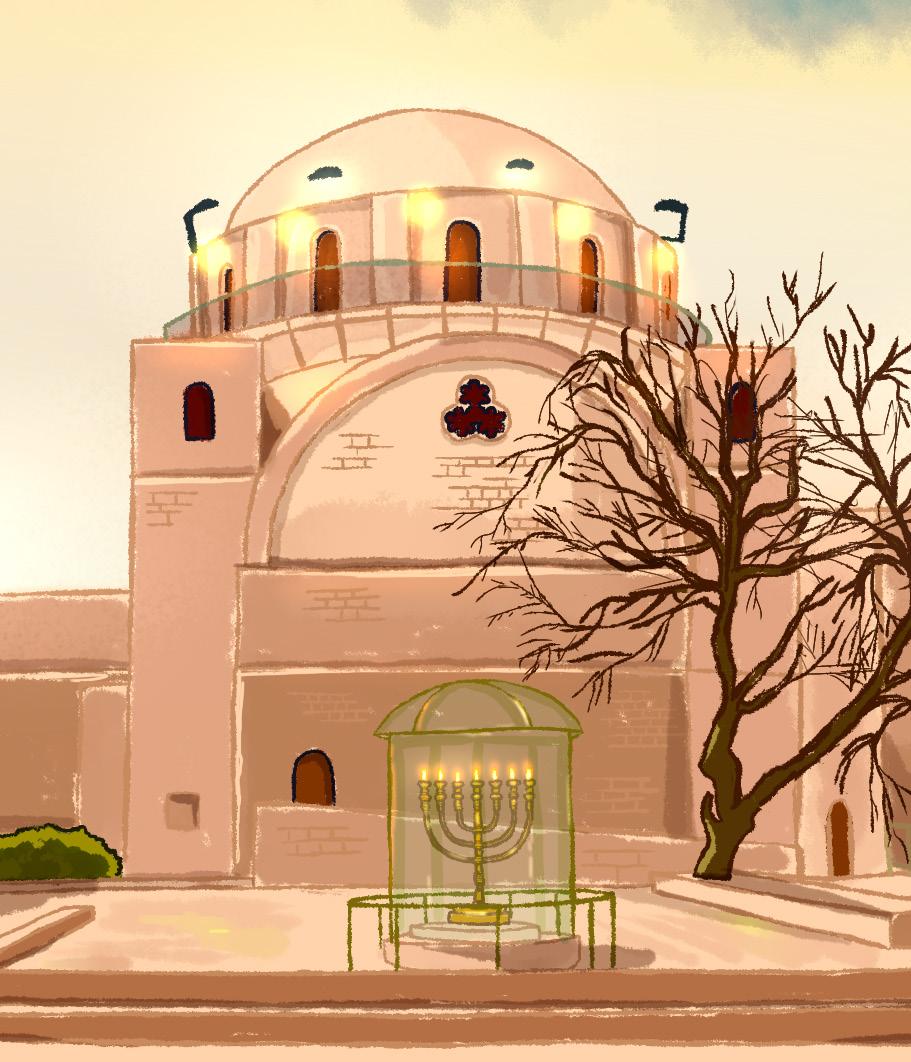
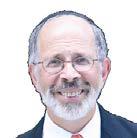
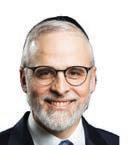
ISSUE 1497 DEC 24TH '22 ג"פשת ולסכ 'ל PARSHAT MIKETZ - SHABBAT CHANUKAHROSH CHODESH ה"ב OU ISRAEL 02-560-9100 | TorahTidbits.com | ADVERTISING 02- 560-9125 ץקמ תשרפ YERUSHALAYIM IN/OUT TIMES FOR SHABBAT PARSHAT MIKETZ CANDLES 4:05PM • HAVDALA 5:21PM • RABBEINU TAM 5:59PM Of Dreams And Journeys Rabbi Shmuel Goldin Faculty, OU Israel page 16 The Root of Positivity Rabbi Moshe Hauer OU Executive Vice President page 8 תנומש ועבקו ולא הכנח ימי ללהלו תודוהל לודגה ךמשל OU Israel wishes you SameachChanukah and Chodesh Tov!
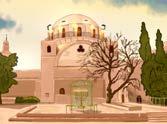
2 TORAH TIDBITS 1497 / MIKETZ 5783
of Contents
04
08
10
16
20
22
26
28
30
32
36
40
50
56
58
62
64
66
68
72םחר
74
76
Table
This week's Torah Tidbits cover image! About the Cover: The cover depicts a scene of the Rova Hayehudi as it looks today with the Menorah in the center. This sketch is taken from the animated series of Chanukah videos offered at chanukahunites.org
Dear Torah Tidbits Family Rabbi Avi Berman
Mikeitz – The Root of Positivity Rabbi Moshe Hauer
Aliya By Aliya Sedra Summary Rabbi Reuven Tradburks
Of Dreams and Journeys Rabbi Shmuel Goldin
“Joseph, Chanukah, and Wisdom” Rabbi Dr. Tzvi Hersh Weinreb
To Wait Without Despair Rabbi Lord Jonathan Sacks zt"l
Probing The Prophets Rabbi Nachman Winkler
Unique Nature of Pirsume Nissa of Chanuka Rabbi Shalom Rosner
Chen of Chanukah Rebbetzin Shira Smiles
Chanukah: Lit Rabbi Judah Mischel
Simchat Shmuel Rabbi Sam Shor
OU Israel Schedule
Chanukah: Lost Jews Rabbi Moshe Taragin
Hashem is In Charge! Menachem Persoff
‘Secrets’ Help To Realize the Redemption Rabbi Aaron Goldscheider
When a Non-Jew “Clicks” a Door Open on Shabbat Rabbi Daniel Mann
The Birth Mother Rabbi Gideon Weitzman
To Be A Miracle in the Life of Someone Else Sivan Rahav Meir
Neta Revay and Shemitah #1 Rabbi Moshe Bloom
Rebbetzin Zemira Ozarowski
The Y- Files Weekly Comic Netanel Epstein
Torah 4 Teens By Teens Devorah Cohen // Kinneret Rosensweig Helpful Reminders • Review of Shabbat Chanukah Candle lighting on page 47 Kiddush Levana Earliest Kiddush Levana, 3 Days After Molad 3 Tevet/ Mon. night Dec. 26 7 Days After Molad 7 Tevet/ Motzei Shabbat Dec. 31 Last Opportunity to Say Kiddush Levana until 14 Tevet/ Jan. 6 all night
CANDLES
VAYIGASH HAVDALA MIKETZ
Yerushalayim / Maale Adumim 4:05
Havdala Candles
5:21
5:26 4:09 5:28 4:27 5:24 Aza area (Netivot, S’derot, Et al) 4:23 5:26 4:28 5:22 Beit Shemesh / RBS 4:23
JERUSALEM
Ranges 11 days Wed - Shabbat Dec. 21-31 / 27 Kislev - 6 Tevet
Earliest Tallit and Tefillin 5:39 - 5:44
Sunrise 6:35 - 6:39
Sof Zman Kriat Shema 9:06 - 9:10

Magen Avraham 8:27 - 8:31
Raanana/ Tel Mond/ Herzliya/ K. Saba 4:20
5:26 4:25 5:22 Gush Etzion 4:21 5:26 4:25 5:22
Modi’in / Chashmona’im 4:20
5:26 4:25 5:22
Sof Zman Tefila 9:56 - 10:01 (According to the Gra and Baal HaTanya)
Be’er Sheva 4:23
Rehovot 4:21
Petach Tikva 4:05
Ginot Shomron 4:19
Haifa / Zichron 4:08
Gush Shiloh 4:19
Tel Aviv / Giv’at Shmuel 4:21
Giv’at Ze’ev 4:20
Chevron / Kiryat Arba 4:21
Ashkelon 4:23
Yad Binyamin 4:21
Tzfat / Bik’at HaYarden 4:11
Golan 4:16
5:26 4:24 5:22
Netanya 4:20 5:28 4:27 5:24
5:27 4:26 5:23
5:26 4:09 5:22
5:25 4:24 5:21
5:24 4:13 5:20
5:25 4:23 5:20
5:27 4:25 5:22
5:26 4:24 5:21
5:26 4:25 5:22
5:28 4:27 5:24
5:27 4:26 5:23
5:22 4:16 5:18
5:22 4:20 5:18
Rabbeinu Tam (J'lem) - 5:59PM • next week - 6:03pm
(20 min. before sundown in most cities, 40 min. in Yerushalyim and Petach Tikva, 30 min. in Tzfat/Haifa)
Chatzot (Halachic Noon) 11:37 - 11:42
Mincha Gedola (Earliest Mincha) 12:07 - 12:12
Plag Mincha 3:36 - 3:41
Sunset (Including Elevation) 4:44 - 4:50
Seymour J. Abrams • Orthodox Union Jerusalem World Center • Avrom Silver Jerusalem College for Adults • Wolinetz Family Shul • Makom BaLev • Birthright • Yachad • NCSY in Israel • JLIC in Israel • Pearl & Harold M. Jacobs ZULA Outreach Center • The Jack Gindi Oraita Program • OU Israel Kashrut
ZVI SAND, PRESIDENT, OU ISRAEL
Yitzchak Fund, Former President, OU Israel Rabbi Emanuel Quint z”l, Senior Vice President | Prof. Meni Koslowsky, Vice President


VAAD MEMBERS: Dr. Michael Elman | Stuart Hershkowitz | Moshe Kempinski | Sandy Kestenbaum | Harvey Wolinetz RABBI AVI BERMAN, EXECUTIVE DIRECTOR, OU ISRAEL
David Katz, CFO, OU Israel | Chaim Pelzner, Director of Programs, OU Israel | Rabbi Sam Shor, Director of Programs, OU Israel Center Rabbi Sholom Gold, Dean, Avrom Silver Jerusalem College for Adults 22 Keren HaYesod <> POB 37015 <> Jerusalem 91370
phone: (02) 560 9100 | fax: (02) 561-7432 email: office@ouisrael.org website: www.ouisrael.org Founders and initial benefactors of the OU Israel Center: George and Ilse Falk a"h
Torah Tidbits and many of the projects of OU Israel are assisted by grants from THE JERUSALEM MUNICIPALITY
OU Israel, Torah Tidbits does not endorse the political or halachic positions of its editor, columnists or advertisers, nor guarantee the quality of advertised services or products. Nor do we endorse the kashrut of hotels, restaurants, caterers or food products that are advertised in TT (except, of course, those under OU-Israel hashgacha). Any "promises" made in ads are the sole responsibility of the advertisers and not that of OU Israel, the OU Israel Center , Torah Tidbits.
OU ISRAEL CENTER 3
AND HAVDALA TIMES CANDLE LIGHTING OU Kashrut NCSY Jewish Action JLIC NJCD / Yachad / Our Way OU West Coast OU Press Synagogue/Community Services OU Advocacy OU
Israel
Chairman of the Board, Orthodox Union | Esther Williams, OU Israel Chair | Gary Torgow, Chair, OU Kashrus Commission RABBI MOSHE HAUER, EXECUTIVE VICE PRESIDENT Rabbi Joshua M. Joseph, Ed.D. Executive Vice President & Chief Operating Officer | Rabbi Dr. Tzvi Hersh Weinreb, Exec. V.P. Emeritus | Shlomo Schwartz, Chief Financial Officer | Lenny Bessler, Chief Human Resources Officer OU KOSHER: Rabbi Menachem Genack, CEO/Rabbinic Administrator OU Kosher | Rabbi Moshe Elefant, COO/Executive Rabbinic Coordinator ISRAEL: Rabbi Yissachar Dov Krakowski, Rabbinic Administrator | Rabbi Ezra Friedman, The Gustave & Carol Jacobs Center for Kashrut Education/Rabbinic Field Representative Headquarters: 40 Rector St. 4th floor, New York, NY 10006 212-563-4000 website: www.ou.org Editor Emeritus: Phil Chernofsky Editor: Rabbi Aaron Goldscheider | aarong@ouisrael.org Advertising: Ita Rochel | 02-5609125 or ttads@ouisrael.org Website: www.torahtidbits.com Not getting enough TTs? Too many? None at all? Contact our DISTRIBUTION 050-577-2111 • ttdist@ouisrael.org
MOISHE BANE, PRESIDENT OF THE ORTHODOX UNION Mitchel Aeder,
OTHER
TImes According to MyZmanim
Z'MANIM
DEAR TORAH TIDBITS FAMILY
RABBI AVI BERMAN Executive Director, OU Israel
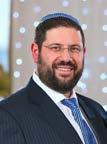
As parents and educators in the 21st Century we have a unique challenge in helping the next generation connect with mitzvot that are far easier to accomplish than they were in the past. This challenge is particularly acute here in Israel where much of our day-to-day life already accommodates halachic requirements, enabling us to fulfill mitzvot with less exertion than previous generations.
For example, I’ve come to appreciate that the average Israeli no longer knows what an eruv is. I’d go as far as to say that Israelis who have not left Israel would be shocked to learn that outside of Eretz Yisrael, there are places where a Jew can and cannot walk on Shabbat. And while there are many other examples that demonstrate how differently we relate to many seems to be one of the clearest examples of this paradigm.
Take for example the pur chase of Not that long ago, our great-grandparents had to perform livestock themselves and learn the ins and outs of how to poultry. Today, Israelis can head to a local ply pick a product from a line of options with a hechsher they trust. While appreciating the beauty of living in Israel where
much of halacha is incorporated into the fabric of our daily lives, we have a responsibility to ensure that the next generation of Am Yisrael does not lose connection to the mitzvot - or the skills required to perform them.
Among the initiatives that OU Israel has created to support olim and visitors to Israel, the Gustave and Carol Jacobs Center for Kashrut Education has reached far beyond the borders of Israel. The Kashrut Education Center was founded in 2019 by the Hoch and Frankel families in memory of their parents who were pioneers in Kashrut in America, ensuring Jews would have easy access to quality Kosher food. I had the distinguished honor of being friends with Gus who was a long-standing OU Board member. I particularly enjoyed hearing about his journey from Switzerland to the United States, and appreciated how clearly he identified the Kashrut needs of American Jewry and immediately dedicated himself to creating programs to support those needs.
Today the Kashrut Education Center, run by Ezra Friedman, a graduate of Yeshivat Ohr Etzion and a close disciple of Rav Zalman Nechemia Goldberg, brings kashrut to the masses. Serving as a source of education
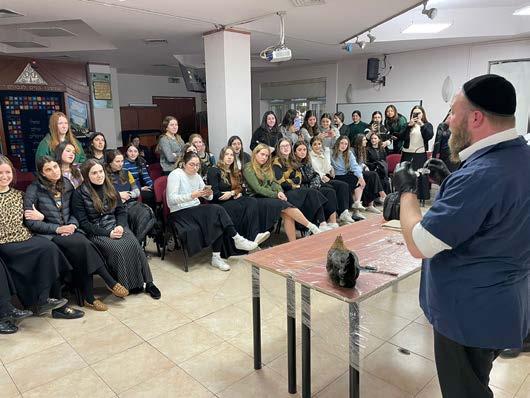
4 TORAH TIDBITS 1497 / MIKETZ 5783
with weekly shiurim, a dedicated column in OU Israel’s Torah Tidbits, engaging videos, and a Kashrut Hotline, the Kashrut Education Center has responded to tens of thousands of she’eilot since its founding. Recognizing the importance of educating students who will Bezrat Hashem be building their own Kosher homes, OU Israel has collaborated with yeshivot and seminaries to bring facets of kashrut to life. Recently we were approached by Sha’alvim for Women (SFW), a seminary empowering young women to become independent Torah learners and thinkers regarding Kashrut education.






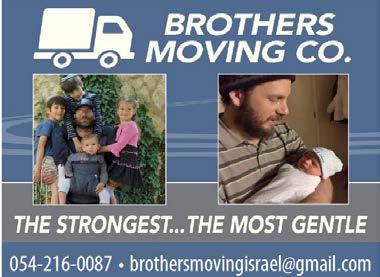
Rav Friedman teaches an in-depth 12-week course on kashrut at Sha’alvim for Women that includes an experiential learning element. Last year, Rav Friedman took the Sha’alvim students on a field trip to Papagayo (for my fellow fleish lovers, I highly recommend it!) in Talpiyot, where the students saw first-hand the complexity of running a kosher restaurant in its OU-certified kitchen. This year, SFW students are exploring the laws relating to kashering meat and chicken. Rav Friedman, Rav Yonatan Korach and I invited Rav Gershon Turetsky, the Rosh Beit Midrash at Sha’alvim, and the students to a live shechitah


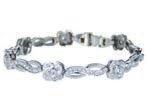
OU ISRAEL CENTER 5 True wholesaler from the diamond boursa with over 25 years experience member diamond dealers club Engagement Rings ∙ Stud Earrings Pendants ∙ Tennis Bracelets 050-573-9061 jeffmor36@gmail.com www.JeffMorDiamondJewelry.com
OU Israel extends a heartfelt Mazel Tov to Mitch & Lita Aeder on the engagement of their son Boaz to Sarah Edelstein Rabbi Avi Berman & the OU Israel Family
demonstration at the OU Israel Center this past Thursday.
Of course, shechitah is not for the faint of heart and sensitivity is required. Rabbi Yom Tov Turk, the head shochet at the Of Tov chicken factory, addressed the 90 students before him with an engaging and meaningful lesson on kashrut. Starting with the mekorot in the Gemara all the way to today’s minhagim, Rav Turk put together a dynamic presentation that allowed these young women to experience kashrut in a new way. Those who were interested were able to watch the live shechitah and say amen to Rav Turk’s bracha, “הטיחשה לע” - a rare zechut for many. In addition, the students physically fulfilled the mitzvah of יוסיכ םדה, in which we are obligated to cover the blood of a slaughtered animal of fowl.
This week’s program illustrated how important it is that we continue to provide opportunities for members of Am Yisrael to experience the Torah and its concepts first-hand, even if the likelihood of performing the mitzvah directly is slim. The




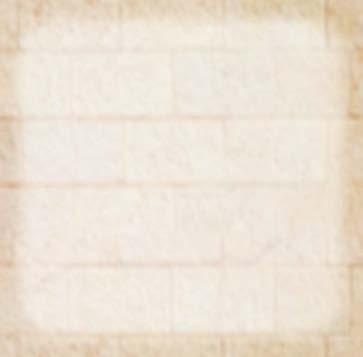


6 TORAH TIDBITS 1497 / MIKETZ 5783
In loving memory of Miriam Korenstein a"h ה"ע בוקעי לאומש תב םירמ on her 7th yahrzeit ג"פשת תבט 'ה and Manfred Korenstein z"l ל''ז קחצי ןב ןסינ השמ whose 23rd yahrzeit was on ג"פשת ןושחרמ ח"י Both greatly missed by their family and all who knew them May the learning from this issue of TT be םהיתומשנ יולעל +972-52-595-5492 H illel M end lowitz A family business with over 40 years of experience in the US and Israel! Real Estate Brokerage Property Management (LT rental, maintenance) Project Management (renovations & construction) ALL YOUR JERUSALEM REAL ESTATE SERVICES UNDER ONE ROOF! ErusalEm J HomEs
OU puts a tremendous amount of thought into the 1.4 million products it certifies to ensure that every product with an OU symbol meets the highest standards of halacha. Beyond that, the OU has countless educational resources to support Am Yisrael around the world in keeping the laws of kashrut




I encourage you all to familiarize yourself with OU Israel’s Kashrut





FOREIGN MINISTRY FOREIGN MINISTRY QUARTER QUARTER JHOMES - 16 KING DAVID STREET, JERUSALEM SEVERAL BRAND NEW WONDERFUL APARTMENTS (INCLUDING GARDEN) IN ONE OF JERUSALEM FINEST RESIDENTIAL PROJECTS. AT KIRYAT HALEOM. NEAR GAN SAKER, NACHLAOT AND THE CITY CENTER. Join us and live the dream.... ד"סב ELIANA BENKOVITZ: 050-393-3350 US Citizenship for your Children and Grandchildren Michele Coven Wolgel Attorney and Notary Specializing in American Immigration and Naturalization Law for over 30 years Early filing critical due to Corona delays!!! www.wolgelaw.co.il www.facebook.com/uscitizenshipinfo lawyer@wolgelaw.co.il Tel: 02 590 3444 Member, AILA (American Immigration Lawyers Association) Of Counsel to Bretz & Coven, LLP www.bretzlaw.com
.
FROM THE DESK OF RABBI MOSHE HAUER OU Executive Vice President

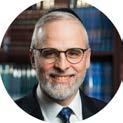
Mikeitz –The Root of Positivity
An environment in which people speak negatively of one another becomes rife with tension, distrust, and toxicity. Indeed, the original exile of the Jewish people came about due to the tension between Yosef and his brothers and Yosef’s badmouthing them to their father. Moshe would later attribute the Jewish people’s bondage to their failings in this same area of toxic speech (see Rashi to Shemos 2:14).
Yet, when we reencounter Yosef later in his life, he has completely changed this behavior. A Midrash (Pesikta Rabbati 3) goes so far as to say that Yosef avoided being alone with his father for the 17 years
that they lived together in Egypt to avoid having to answer his questions about what had transpired between him and his brothers. In fact, he hardly spoke ill of anything, with the notable exception of his complaint to the butler and baker about his imprisonment.
How did Yosef turn around so dramatically?
In Egypt, as the Torah clearly attests, Yosef developed the ability to see the divine hand in everything. This enabled him to see and articulate the good in his situation, how even the difficulties he experienced were all positioning him to provide salvation for his family. In his eyes all was good, and so there was little motivation or urge to speak negatively about his situation or about others.
This is indeed the critical phrase in the verses (Tehillim 34) that discourage us from bad mouthing others: “Who desires life, loving each day to see good? Guard your tongue from evil and your lips from speaking deceit, turn from evil and do good, seek peace and pursue it.” It is indeed difficult to refrain from letting out the negativity and bitterness that may reside inside us. If, however, we can follow the path of Yosef and allow our faith in G-d to inform our outlook, we can succeed in transforming our perspective and therefore our words to reflect positivity and sweetness, creating a beautiful environment around us.
8 TORAH TIDBITS 1497 / MIKETZ 5783
In beloved memory of our dear mother, grandmother, and great-grandmother Elisabeth Somogyi a"h ה"ע בוקעי תב הרש on her 19th yahrzeit - ולסכ בכ Rochelle & Stefan Somogyi grandchildren & great-grandchildren May the Torah learned from this issue of Torah Tidbits be נ"על
Most exquisite properties in Jerusalem!!

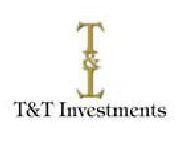
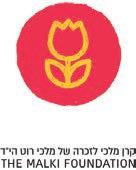
New Listing! On the exquisite Dubnov St. in Talbieh, private 135m cottage, totally renovated with 65m private landscaped garden, view from balconies, a real gem! MAYA - 054-6650184
Magnificent Authentic private house on a small dead end of Baka - 650m built on 3 levels with huge basement, 750m plot with wonderful landscaped garden, thoughtful layout, an abundance of light,a unique property! DEBORAH - 054-4804767
Luxurious garden apartment on a small lane of Old Katamon, 340m built on 2 levels, 8 rooms, separate unit with separate entrance, high ceilings, full of charm, very quiet & bright, 130m private garden, top of the line finishes, close to the park DEBORAH- 054-4804767
In a small lane of the German Colony, Garden apartment with private entrance, 250m with private garden, parking, high ceilings, in an Authentic beautiful 3 apartment building MAYA – 054-6650184
Beautiful new penthouse in Greek Colony- 190m with 80m terraces, succah, beautiful views, 5 rooms, elevator, parking, renovated at very high standard, spacious living areas and huge kosher kitchen
MAYA – 054-6650184

On the edge of The German Colony - Unique Authentic building of 700m built on a huge plot of 1,200m - perfect for an apartment building or a tremendous private house. DEBORAH - 054-4804767
Private small building in Baka, Shimshon St. 300m with additional building rights, huge private garden, divided into 3 units so can be private house of 3 separate apartments, very attractive price DEBORAH - 054-4804767
On the exquisite Elcharizi St., Rechavia, new project, new 280m penthouse, 100m terraces, finishes and layout according to buyer requests!
DEBORAH - 054-4804767
Ben Maimon St. Duplex new apartment, 5 bedrooms, 4 ensuite, 4 terraces, private parking, Shabbat elevator, all renovated, 3 exposures, very sunny!!
DEBORAH-054-4804767


OU ISRAEL CENTER 9 kerenmalki.org 02-567-0602 Keren Malki empowers families of children with special needs in Israel to choose home care. Donations are tax-approved in Israel, US and UK. Honoring the memory of Malka Chana Roth ד”יה 1985-2001, killed in the Sbarro bombing. 7 people means me. is when what those purpose next
the
the to accept
the
tell My MarSea Modest Swim & Casualwear www.MarSeaModest.net (NIS) www.MarSeaModest.com ($USD) Marci Rapp 050-424-8359 davidz@AshkelonProperties.com LIVE OPPOSITE THE SEA 0544-332621 said another happy client Owning your own apartment does not just allow you freedom, but offers monetary savings, and an increase in your investment value. Anglo-populated, sunny Ashkelon is the answer! It’s very affordable – from $500,000 with just a 15% down payment, mortgages available as well as bank guarantees. Rental income often in excess of 3.5%.
very
heard.
his is
G-d, his humility. people oppoas-
T&T INVESTMENTS 02-6744000 0544-804767 King David St. 26 www.real-estate-jerusalem.co.il LEADING BOUTIQUE REAL ESTATE FIRM, O n M e n d e l e S t . T a l b i
renovated, •
completely
KI TEITZEII
MIKETZ
ALIYA-BY-ALIYA SEDRA SUMMARY
Rabbi Reuven Tradburks Director of RCA Israel Region
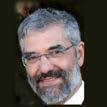
Yosef ascends from jail to complete control of Egypt. Paro has a dream. The Butler remembers Yosef in jail. Yosef tells Paro of 7 impending years of plenty followed by 7 of famine. Yosef is appointed to manage the hoarding of food in the good years. When the famine begins, the whole world turns to Yosef for food. Including his family. Yosef recognizes his brothers; he accuses them of spying. Shimon is kept in jail, the brothers return home to bring Binyamin. When the need for food forces them back to Egypt, Binyamin is brought
with them. Yehuda guarantees his return to Yaakov. Yosef plants his goblet with Binyamin, punishes him with remaining a slave in Egypt.
1st Aliya (41:1-14) 2 years later (after the Butler’s return to serve Paro), Paro dreams. 7 healthy cows emerge from the water, devoured by 7 skinny ones who emerge after. 7 healthy stalks are devoured by 7 parched ones. Paro is not satisfied by the dream interpretations of his wise men. The Butler remembers Yosef, telling Paro of him. Yosef is shaved, dressed and rushed to Paro.
Dreams aplenty. Yaakov dreamt of the ladder and the angels. Yosef had 2 dreams. The Butler and Baker had dreams. Now Paro has 2 dreams.
But there are subtle differences in who, when and how many. Yaakov had one dream: 1 man, 1 dream, 1 night. Yosef had 2 dreams, but not on the same day. So with Yosef; 1 man, 2 dreams, 2 nights. The Butler and Baker; 2 men, 2 dreams, 1 night. And Paro; 1 man, 2 dreams, 1 night.
When Yosef is successful in interpreting both the Butler and Baker and Paro’s dreams, does he wonder about his dreams? Does he think his dreams may still come true? Or does he assume his dreams don’t match the pattern; the others were 2 dreams, one night. His were 2 dreams, 2 nights. Or perhaps 2 nights is a sign that they will take a long time to occur. Maybe even over 20 years.
2nd Aliya (41:15-38) Paro relates the dreams to Yosef. Yosef tells Paro that the 7 years of plenty will be followed by 7 years of famine. Now,
10 TORAH TIDBITS 1497 / MIKETZ 5783
May the Torah learned from this issue be in loving memory and נ"על Ronald Markowitz z"l ל"ז ךורב ןב ןבואר First Yahrzeit - Rosh Chodesh Tevet 7th day of Chanukah Sorely missed by his wife, children, grandchildren, great-grandchildren, siblings, extended family and friends Miriam Markowitz Gershon & Debbie Markowitz Yaakov & Joyce Markowitz Rena Markowitz
Paro you shall appoint a wise person to hoard food during the plenty, to avoid the lands collapse during the famine. Paro responds: could one like this be found who has G-d’s spirit in him?
Dream interpretation is a rich subject. If the dream is of plenty and famine, I get healthy stalks being devoured by sickly ones. But stalks don’t eat. And what do cattle have to do with agriculture? Why are cows walking out of the Nile? Ok, cows can eat each other, whereas stalks can’t. But stalks are agriculture, cows aren’t.
The name Elokim appears 7 times in this exchange between Yosef and Paro. When a word is repeated 7 times, it is a signal – take note, this is central. The story of Yosef’s sale, his descent to Potiphar’s home, his being framed by Mrs. Potiphar, thrown in jail, is a downward spiral designed by the hands of man. But all that is about to change, for G-d’s Hand is entering the story.


3rd Aliya (41:39-52) Paro appoints Yosef over all of Egypt; he receives the signet ring, the






OU ISRAEL CENTER 11
LIVE OPPOSITE THE SEA davidz@AshkelonProperties.com call David at 054-433-2621 www.ashkelonproperties.com Owning a SEA VIEW apartment in Ashkelon is almost like celebrating Hanukkah all year round! C o n t a c t u s f o r t h e l a r g e s t s e l e c t i o n o f s e a - v i e w p r o p e r t i e s f o r s a l e o r r e n t The Torah learned on Thursday, December 15th was in loving memory and in תמשנ יוליעל SYLVIA DAVID a"h ה"ע בייל הירא תב היבצ היח whose yahrzeit was on 22 Kislev Mel David - Loving Husband Children: Gitty & Ari Wertenteil, Nechama & David Sondhelm, Tova & Mordechai David Grandchildren and Great Grandchildren May her soul be eternally blessed
royal clothes, rides the royal chariot, receives the Egyptian name Tzafnat Paneach and marries. He gathers the grain in the years of plenty. His 2 sons are born; Menashe, G-d has allowed me to forget my father’s home and Ephraim, G-d has made me prosper in Egypt.
In an instant, Yosef has gone from the foreign lad in jail, to the number 2 man in the land. But. The wrong land. Aren’t we supposed to be settling the Land of Israel? In our absorption in a wonderful story of twists and turns, we forgot that the story of the Torah is the promise to Avraham: Your children will inherit the Land. Of Israel. Not Egypt. The shift of the story of the Jewish people has moved entirely from Israel to Egypt right under our noses.
And don’t we all love the Midrash that the Jews were redeemed from Egypt for not changing their names, their clothing or language. Yosef is given new clothes, and a new name in a new language. Yosef seems to have become the quintessential Egyptian.
4th Aliya (41:53-42:18) The famine begins. Paro instructs his people to go to Yosef, for Yosef has opened the storehouses. Yaakov sends his sons, save Binyanim, to Egypt to get food. When the brothers bow to Yosef, he recognizes them. He remembers his Mazal Tov to Dr. Lawton and Robin Cooper on the birth of their grandson Aharon Yehuda and to their children
Shulie & Jason Brafman of Yerushalayim
dreams. Yosef challenges the brothers, claiming they are spying Egypt. To prove they are not, he demands they bring Binyamin. And puts them in jail for 3 days.
What did Yosef think when he saw the brothers? All the commentators grapple with Yosef’s response. Why not say hello to them? Why hide? Varied are the responses. But on the level of metaphor or drush –what an image. The Jew, successful, wildly successful, in the highest offices of his new land, with his new language, his new name, his new clothes; is unrecognizable to his brothers. And he himself, so comfortable in his new world, cannot find the words to bridge the gap.
5th Aliya (42:19-43:15) Yosef tells the brothers that one should stay behind while the rest return home and bring Binyamin to him. They respond to themselves; this has occurred because of how we treated Yosef. Yosef cries upon hearing this. Shimon is jailed. Yosef places their money with their grain. When they discover this, they wonder why G-d is doing this. Yaakov is distressed at the thought of Binyamin leaving him. But when the food runs out, there is no choice. Yehuda guarantees Binyamin’s safe return. They return and stand before Yosef.
The brothers feelings of guilt for the sale of Yosef seem to persist even 20 years later. Over 20 years later, in Egypt, buying food – when things turn into a crisis, with Yosef demanding they bring Binyamin, the brothers immediately blurt out: we are getting our due for selling Yosef. They have been waiting for calamity to befall them, knowing it will surely come. But of
12 TORAH TIDBITS 1497 / MIKETZ 5783
course, they mean this is G-d meting out a form of punishment to them. When really, it is Yosef who is manipulating them. So, it isn’t G-d, it’s Yosef. Or is it? Maybe they are right. Yosef is repeatedly described as successful in Egypt; in Potiphar’s home, in the jail, and now as number 2 in the land. He is efficient and definitive. Yet, here, he is capricious; puts them all in jail, says they should all remain in jail and one return, then changes his mind, one stay in jail, all return. Either Yosef is beside himself and winging it, not really knowing what to do. Or maybe the brothers are not the only ones being manipulated. Maybe Yosef too is a puppet in the Divine Hands – he makes a move, and He puts into his head something different. In order to bring the Jews to Egypt.
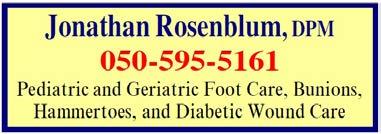
6th Aliya (43:16-29) The brothers receive a royal welcome from Yosef upon their return with Binyamin. They apologize for the money they found in their grain sacks. Yosef tells them not to worry for their G-d has given them a gift. The brothers are treated to a fine dinner. Yosef inquires of their father and sees Binyamin.
Binyamin is Yosef’s brother, the only other born from Rachel. Binyamin was very young when Yosef was sold. This is 22 years later. Yosef would not recognize Binyamin. The aliya ends on a pregnant note – he sees Bin yamin – and then what? The next aliya begins with Yosef cry ing. Yosef does a lot of crying in the story. At the same time, for
BY RABBI Rav,



OU ISRAEL CENTER 13
GET A PROFESSIONAL VISION EXAM 02-674-3888 FREE exam with purchase USING THE MOST ADVANCED DIAGNOSTIC EQUIPMENT Multifocal Experts Contact lens fittings Satisfaction guaranteed! • Wide selection of beautiful frames You Deserve a Professional Vision Exam Please call for an appointment Macabi and Meuchedet benefits 12 TORAH TIDBITS 1440 / CHAYEI SARA 5782
Beit Knesset When Avraham addresses the people of Cheit, trying to “Ger V’Toshav Anochi Eimachem” (23:4) “A Stranger and This seems to be a contradiction. If one is a stranger than The Magid of Dubno (Jacob ben Wolf Kranz 1741-1804) this tense situation in order to, both, state his truth and be said, on the one hand, “I am a Resident’ due to G-d’s promise need your agreement to purchase a plot. In other words, Avraham “strangers”, while they understood him as saying that “they” The peace was kept, and Avraham remained true to his completes the generational transfer – He
will be Yitzchak and not
blesses Yitzchak. The Jewish people
Yishmael.tions of Yishmael are enumerated. Yishmael dies. Hisous and powerful offspring. The brevity and began father’s that his icant the
the brothers, they swing up and down. Nervous as to how he will react. Relieved at the banquet he serves them. But then crashing down when in the next aliya the goblet is planted with Binyamin.
7th Aliya (43:30-44:17) Yosef sits the brothers in the order of their birth. They are surprised. Their sacks are packed with grain, their money returned. And Yosef’s goblet is planted in the sack of Binyamin. No sooner had they left, Yosef orders the guards to pursue. The goblet is found in the sack of Binyamin. They return to Yosef. Yehuda offers that they all stay as slaves. Yosef demurs; the thief alone shall be a slave. The rest of you return home in peace to your father.
The swing of fortune of the brothers is dramatic. Accused of being spies, yet their money returned with their grain. Treated royally upon their return, money again returned with their grain. Yet, accused of theft. And the stage is set for an even more
A SHORT VORT
dramatic swing: Yosef finally revealing himself to them.
*The above aliyot are the standard seven aliyot, however on this Shabbat we add the Torah reading for Rosh Chodesh and Chanukah.
HAFTORAH SHABBAT CHANUKAH ZECHARIA 2:14 - 4:7
The special haftorah for Chanukah contains the glorious vision of the golden Temple Menorah.
This hafotrah’s unique message was prophesied by Zecharia in close proximity to the building of the second Beit Hamikdash. Within this context this exquisite passage describes the exuberant joy that will prevail when Hashem’s presence returns to Yerushalayim.
Hashem, in Zecharia’s prophecy, proceeds to articulate the great reward awaiting Yehoshua, the first Kohen Gadol
BY RABBI CHANOCH YERES R av, Beit Knesset Beit Yisrael, Yemin Moshe
As we enter the last days of Chanukah, there is a question asked about the Torah reading: Why does the section dealing with the Menorah (Parshat Beha’alotcha immediately follow the section of the dedication-offerings of the Nesiim of the tribes (Parshat Naso)?
Rashi mentions the Midrash Tanchuma that when Aaron the High Priest saw the dedication-offerings of the Nesiim, he became disheartened because neither he nor his tribe participated with the dedication; whereupon G-d said to Aaron that his contribution is of greater significance- the daily kindling of the Temple Menorah.
The Ramban (Rabbi Moshe ben Nachman) asked why was the daily kindling of the Menorah used to console Aaron and not all the Temple service that only Aaron can perform like the burning of the daily incense or all the offerings as well as the entering of Holy of Holies?
Ramban quotes the Scroll of Hidden Things of Rabbeinu Nissim Goan (first half of 11th century, Kairwan community, North Africa) that the intention of this homiletic text is to derive an allusion from the section of the Torah to the Chanukah (Dedication) of lights which occurred during the period of Second Temple through Aaron and his sons, namely Matityahu the Chasmonai who was High Priest and his sons.
Therefore G-d placed the section dealing with the lighting of the Menorah next to the section concerning the dedication of the altar. Shabbat Shalom and Chanukah Sameach
14 TORAH TIDBITS 1497 / MIKETZ 5783
and our next step will be to plant a fruit tree. I never thought of myself as being the agricultural type, but the feeling of settling and planting a portion of Eretz Yisrael, has been truly euphoric. Iy”H, when we plant our tree, and eat the fruits that will grow one day, I think we will be able to truly appreciate that unique Kedusha found in the fruit of Eretz Yisrael!
to serve in the second Beit Hamikdash, if he and his descendants follow the ways of the Torah. The reward will be: “Behold! I will bring My Servant, the Shoot.” This is an allusion to the Mashiach, the ‘shoot’, the descendant of David.


Zecharia then powerfully witnesses in his mind’s eye a golden seven-branched Menorah. An angel offers an explanation of the vision: “This is the word of the Lord to Zerubbavel - ‘Not by force and not by physical might, by my spirit,” says the Lord of Hosts.”
To conclude, when you buy your Tu B'shvat fruit this year, don’t search for those dried apricots and banana chips imported from Turkey. Rather, head over to the fresh produce and buy yourself some nice juicy Kedusha-filled Jaffa oranges and thank Hashem for bringing you to this land in order to be able to הבוטמ עבשלו הירפמ לוכאל, imbibing that Kedusha in every bite that you take!!

With these words the Navi conveys a message of hope and the promise that the redemption will surely arrive. The light off the Menorah is a symbol of God’s shechina, His holy presence, that will soon be manifest in the land of Israel and will ultimately be visible for all humanity to behold. May that day come soon!
10th of 54 sedras; 10th of 12 in B’reishit; Written on 254.6 lines, ranks 6th. Mikeitz is a one Parsha P’tucha (open)(the lon gest parsha in the whole Torah)

Contrast this parsha’s 2022 words with the short est parshiyot with 2 words 146 p’sukim - rank: 8th (5th in B’reishit) tied with B’reishit (the sedra)
2022 words - ranks 3rd (2nd) 7914 letters - ranks 2nd (first) Mikeitz’s p’sukim are unusually long for a big sedra. That’s why it is so high in the rankings for words and letters. On the other hand, with no parsha breaks, the “number of lines rank” drops a bit.
No mitzvot are counted from Mikeitz. One of 17 sedras without mitz
OU ISRAEL CENTER 15
OU ISRAEL CENTER 75
MIDEI CHODESH
B'CHODSHO
Of Dreams and Journeys
Something amazing happens in Parshat Miketz…the Torah provides us with a glimpse into Pharaoh’s mind.
To observe this phenomenon, we must apply a basic rule of Torah study. The text never repeats a conversation or an event without reason. If such repetition occurs, the Torah is urging us to compare the two presented versions. Differences will invariably appear between the accounts, carrying significant ideas and lessons.
The Parsha opens with a detailed description of Pharaoh’s troubling dreams.1 Soon after, the dreams are described again in detail, as Pharaoh recounts his visions to Yosef. Why the redundancy? The Torah could have simply stated, “And Pharaoh
1 I refer to the dreams in the plural, because that is how Pharaoh’s court perceives them at this point in the narrative. Yosef will soon accept Pharaoh’s own conviction that the dreams are to be seen as one whole entity.
BY RABBI SHMUEL GOLDIN
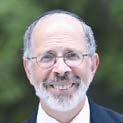
told the content of his dreams to Yosef.”
Upon consideration, the reason for the “repetition” is clear. The Torah is inviting us to peer into Pharaoh’s mind. When Pharaoh speaks to Yosef, he conveys not only his dreams but his perception of those dreams.
Specifically, two addenda appended by Pharaoh to his first vision may well reveal why the king is so “troubled” by his dreams. These addenda are italicized below:
1. The king dreams: “And behold out of the river emerged seven cows, of beautiful appearance and healthy flesh…. And behold seven other cows emerged from the river after them, poor of appearance and gaunt of flesh…”
The king recounts: “And behold out of the river emerged seven cows, of healthy flesh and beautiful form…. And behold seven other cows emerged after them, scrawny, and of very poor form and emaciated flesh. Never have I seen inferiority such as theirs in all the land of Egypt.”
Pharaoh is clearly disturbed by the possibility that “scrawny, emaciated cows” could even appear in Egypt at all. Like so many monarchs before and after him, Pharaoh prefers to live in a fantasy world of absolute power and success. There is no place in the king’s lush, rich empire for “weak cows.” Pharaoh, therefore, emphatically declares that no such cows have ever before appeared in his land, as he desperately attempts to avoid the ramifications of
16 TORAH TIDBITS 1497 / MIKETZ 5783
Faculty, OU Israel Rabbi Emeritus, Congregation Ahavath Torah, Englewood NJ
Mazal Tov to Richard and Brondie Levine and family on the marriage of Nechama to Efi Weisz
his vision.


2. The king dreams: “And the seven cows of poor appearance and gaunt flesh consumed the seven cows of beautiful appearance and good health, and Pharaoh awoke.”
The king recounts: “And the emaciated, inferior cows consumed the first seven healthy cows. And they came inside them and it was not apparent that they came inside them – for their appearance was as inferior as before; and I awoke.”
In Pharaoh’s world, nations conquer other nations with regularity. Through subterfuge and cunning, the seemingly weak can even defeat the seemingly strong. The king can therefore accept the possibility of lean cows eating healthy cows.
What Pharaoh cannot accept, however, is the possibility that the victor in a battle should remain unchanged. In the king’s world, conquest invariably bestows increased physical power and strength upon the victor. This rule is the basis of Pharaoh’s own supremacy. When, in his vision, the lean cows remain visibly unaffected after consuming the healthy cows, Pharaoh’s world is threatened and he awakens abruptly, sorely troubled and distraught.
Yosef sets the king’s mind at ease by explaining both the existence of the lean cows and their unchanged status in symbolic terms. Pharaoh’s visions, he asserts, represent natural challenges that can be overcome through proper planning.
Little does Pharaoh know, however, that his fears are actually well-founded. There is, unbeknownst to Pharaoh and perhaps even to Yosef, a hidden subtext to these visions. Pharaoh is about to be threatened

OU ISRAEL CENTER 17
Certified
054-471-8420 Personal training is for you! Frustrated that you can't get into shape? Don't have the time or motivation to go to the gym? Diastasis recti rehabilitation Work out in the comfort of your home Senior fitness change begins with you.
Rachel Feld
Personal Trainer
in ways he can scarcely begin to imagine.
The king’s dreams set in motion a series of events that eventually give rise to the birth of a unique nation within his very realm. This eternal Jewish nation will not be bound by the rules governing Pharaoh’s world. Spiritual fortitude will overcome physical strength, as these seemingly weak people outlasts the most powerful empires in the history of mankind. Pharaoh’s kingdom will be only the first to fall in the face of the Jews’ march across the face of history.
The victorious Jewish nation, however, will not change overtly over countless generations. We will measure our success, not in terms of increased physical strength, but in the unbroken maintenance and development of our enduring spiritual heritage.
“Lean cows” will consume “robust cows.” The physically weak will overcome the strong, yet remain unchanged. Pharaoh’s world is about to crumble; he has good reason to be troubled by his dreams.
As we kindle the Chanuka lights this year, it would be worthwhile to consider the multiple stanzas we could add to the song of Maoz Tsur. How many additional obstacles has our nation overcome since that ballad was first penned in 13th century Germany?2 How
2 While the exact origin of Maoz Tsur remains uncertain, most authorities date its composition to 13th century Germany, in the aftermath of multiple waves of Crusades and
many other adversaries have disappeared into the mists of history; while we, against all odds, have not only survived, but thrived.
Chanuka, however, carries another, more sober, message, as well; a message tailored to our times. The Maccabean victories ushered in a period of Jewish physical supremacy. Before long, however, the Hasmonean Dynasty lost its way. Internal corruption and strife led to national decline and ultimately, once again, to exile from our land.
If we are to succeed in turning our return to the land into the ultimate redemption, we must remember that the parameters of our historical journey remain the same. Even in a time of physical strength, we remain dependent upon God’s benevolent care. And God’s care must be earned through the quality of our relationship with Him and with each other. At a time when so much of the world is pulling apart, we must find a way to heal Israel’s fractious society and work together towards our common goals.
Who could have imagined, as Pharaoh tossed and turned under the weight of his dreams; that the soon-to-be-born Israelite nation would traverse the face of history, while so many others would rise and fall. Who could have imagined the continuity of a journey that would ultimately, with God’s help, bring us home. Now that we are here, the next step of the journey is in our hands.
blood libels.
18 TORAH TIDBITS 1497 / MIKETZ 5783
Rabbi Goldin is the author of the OU Press volumes “Unlocking the Torah Text,” and “Unlocking the Haggada."
MAZAL TOV TO Binyamin & Nancy Chernofsky and family on the birth of a grandson


OU ISRAEL CENTER 19 COME WITH US! SWI M M I N G P O O L T H E AT E R , M OVI E A N D LE C T U R E H A L L H E A LT H A N D F I T N E S S C E N T E R C LA S S E S A N D LE I S U R E AC T IVI T I E S F I T N E S S C E N T E R A N D GY M O R G A N I Z E D T R I P S H E A LT H C L I N IC APARTMENTS IN THE PRESTIGIOUS HOD DENYA RETIREMENT RESIDENCE COMPLEX, FOR PURCHASE IN YOUR NAME IN THE LAND REGISTRY WITHOUT A DEPOSIT AND WITHOUT EROSION Hod Denya Jerusalem Assisted Living For details and registration: 02-5001177 21 Golomb St., Jerusalem | Search Hod Denya on www.hoddenya.com OCCUPANCY SOON! Rabbi Dr. Nachum Amsel 0522-52-00-31 Namsel@netvision.net.il
THE PERSON IN THE PARSHA
BY RABBI DR. TZVI HERSH WEINREB OU Executive Vice President, Emeritus
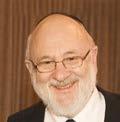
“Joseph,
Chanukah, and Wisdom”
Wisdom is the rarest of all important human qualities. Observers of the contemporary state of affairs often remark that wisdom, which is especially necessary in this day and age, is now particularly lacking.
Yet, at the same time, we are told that there is an age in life when most of us finally do obtain wisdom. Erik Erikson, the famous psychologist and thinker, believes that the course of the lifespan is marked by a series of developmental stages. At each stage of life, we master different developmental tasks. In late middle age, about age
sixty, one begins to achieve wisdom. Erikson’s book, Childhood and Society, devotes an entire chapter to defining wisdom and to detailing the process by which one achieves it, or fails to achieve it.
What is wisdom from a Jewish perspective? And what does wisdom have to do with this week’s Chanukah theme?
The search for wisdom is a frequent biblical theme. King Solomon was once assured by the Almighty that he would be granted the fulfillment of one wish. He wished for wisdom, obtained it, and is therefore termed in our tradition the wisest of all men.
Reading this story of Solomon and other sacred texts leads to the conclusion that there are at least two components to wisdom. There is a knowledge base; mastery of the facts and its data. There is also, however, the essential ability to select from this database those bits of knowledge which apply to the situation at hand.
There is the mastery of material, and there is the ability to advance that material and make it relevant.
Shirley Freedman, Ruth Freedman, Shira & Lionel Isaacs, Abigail Freedman
One of the early 20th century masterpieces in the field of Jewish ethics is a book by Rabbi Joseph Hurvitz of Novardok, entitled Madregas Ha’Adam (Man’s Stature). Torah wisdom is one of Rabbi Joseph’s themes. He insists that mastery of the corpus of Jewish law in and of itself does not constitute wisdom. Knowledge in “matters of the world” is also necessary; abstract
20 TORAH TIDBITS 1497 / MIKETZ 5783
In loving memory of our beloved husband, father and grandfather Ben Freedman z”l May the Torah learning from this issue be תמשנ יוליעל ל"ז סחנפ ןב לארשי ןויצ-ןב Your memory is cherished and you are greatly missed by your wife, children and grandchildren.
knowledge must be interrelated with concrete reality.
The symbol of the Chanukah festival is, of course, the Menorah. The original Menorah in the holy Temple was situated in the southern end of the inner Temple shrine and consisted of seven branches.
The Menorah symbolizes the light of wisdom, and its seven branches, the seven classical areas of wisdom, which include not only knowledge of the divine, but also mathematics and music.
Combining the wisdom symbolized by the Menorah with Rabbi Joseph’s insights, we begin to appreciate the complexity of the concept of wisdom. It encompasses theoretical and practical knowledge, and it involves the seven major areas of human inquiry.
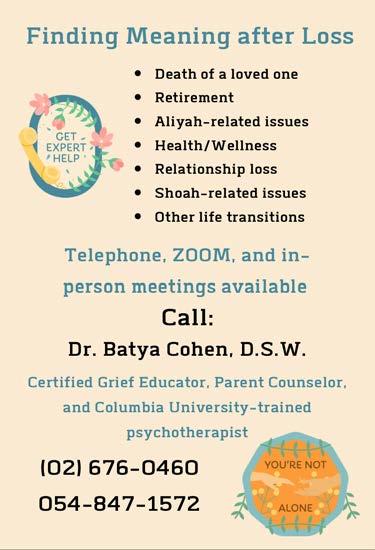
It is in this week’s Torah portion, Miketz, we encounter the first man to be known as wise, to be recognized as a fount of wisdom. That man is the biblical Joseph, and it is the Pharaoh of Egypt who calls him wise.
You know the story. The Pharaoh has his dreams, Joseph interprets them and suggests a plan of action. Pharaoh is pleased by the plan and says to his courtiers, “Could we find another like him, a man in whom is the Spirit of God?” And he continues and says to Joseph, “Since God has made all this known to you, there is none so discerning and wise as you”.
The Pharaoh recognizes that wisdom is not only mastery of facts and the ability to apply them; it is more than familiarity with the seven branches of worldly wisdom, and it is even more than life experience. Besides all that, it is a gift of God.
I have had the good fortune of meeting several wise people in my life, and I am sure
that most of you have as well. Whenever I have met such people, I have been struck by how their words seemed to come from a higher place. Their insights reflect that they have access to a source beyond my ken.
This was Pharaoh’s experience when he heard Joseph’s interpretation. He realized that no course of study - no training, no mastery of expertise - was sufficient to account for the good counsel that he was hearing. He knew that the man in front of him was blessed with the Spirit of God.
There is no better time than this Shabbat, as we celebrate Shabbat Chanukah and read the story of Joseph, to reflect upon the quality of human wisdom and to fully appreciate this lesson: Whatever else wisdom comprises, it has one indispensable ingredient. It is ultimately the inspiration of the One Above.
OU ISRAEL CENTER 21
May
Thoughts on the Weekly Parsha from RABBI
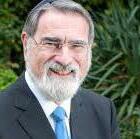
To Wait Without Despair
Something extraordinary happens between the previous parsha and this one. It is almost as if the pause of a week between them were itself part of the story.
Recall last week’s parsha about the childhood of Joseph, focusing not on what happened but on who made it happen. Throughout the entire rollercoaster ride of Joseph’s early life he is described as passive, not active; the done-to, not the doer; the object, not the subject, of verbs.
It was his father who loved him and gave him the richly embroidered cloak. It was his brothers who envied and hated him. He had dreams, but we do not dream because we want to but because, in some mysterious way still not yet fully understood, they come unbidden into our sleeping mind.
His brothers, tending their flocks far
from home, plotted to kill him. They threw him into a pit. He was sold as a slave. In Potiphar’s house he rose to a position of seniority, but the text goes out of its way to say that this was not because of Joseph himself, but because of God:
God was with Joseph, and he became a successful man. He lived in the house of his Egyptian master. His master saw that God was with him, and that God granted him success in all that he did. (Gen. 39:2–3)
Potiphar’s wife tried to seduce him, and failed, but here too, Joseph was passive, not active. He did not seek her, she sought him. Eventually, “she caught him by his cloak, saying, ‘Lie with me’! But he left his garment in her hand, and fled and ran outside” (Gen. 39:12). Using the garment as evidence, she had him imprisoned on a totally false charge. There was nothing Joseph could do to establish his innocence.
In prison, again he became a leader, a manager, but again the Torah goes out of its way to attribute this not to Joseph but to Divine intervention:
God was with Joseph and showed him kindness, granting him favour in the sight of the prison warden… Whatever was done there, God was the one who did it. The prison warden paid no heed to anything that was in Joseph’s care, because God was
22 TORAH TIDBITS 1497 / MIKETZ 5783
ה״ע
ה״ע רטרש
תומשנ יוליעל
זייא דוד לארשי תב הדלוגו רשא בקעי ןב סחנפ
קחצי תב הינעמו בייל הירא ןב לאירזע
LORD JONATHAN SACKS ZT"L
Former Chief Rabbi of the United Hebrew Congregations of the Commonwealth
COVENANT & CONVERSATION
the learning of these Divrei Torah be תמשנ יוליעל HaRav Ya'akov Zvi ben David Arieh zt"l
with him; and whatever he did, God made it prosper. (Gen. 39:21–23)
There he met Pharaoh’s Chief Butler and Baker. They had dreams, and Joseph interpreted them, but insisted that it is not he but God who was doing so: “Joseph said to them, ‘Interpretations belong to God. Tell me your dreams.’” (Gen. 40:8)
There is nothing like this anywhere else in Tanach. Whatever happened to Joseph was the result of someone else’s deed: those of his father, his brothers, his master’s wife, the prison warden, or God Himself. Joseph was the ball thrown by hands other than his own.
Then, for essentially the first time in the whole story, Joseph decided to take fate into his own hands. Knowing that the chief butler was about to be restored to his position, he asked him to bring his case to the attention of Pharaoh:
Remember me when it is well with you; please do me the kindness to make mention of me to Pharaoh, and so get me out of this place. For indeed I was stolen out of the land of the Hebrews; and here also I have done nothing that they should have put me into prison. (Gen. 39:14–15)
A double injustice had been done, and Joseph saw this as his one chance of regaining his freedom. But the end of the parsha delivers a devastating blow: “The chief cupbearer did not remember Joseph, and forgot him” (39:23). The anticlimax is intense, emphasised by the double verb, “did not remember” and “forgot.” We sense Joseph waiting day after day for news. None comes. His last, best hope has gone. He will never go free. Or so it seems.
To understand the power of this


OU ISRAEL CENTER 23
Harry Weisman Former Assist. Clinical Professor of Medicine, UCLA School of Medicine; Div. of Endocrinology & Metabolism Weight loss Consultation +972 53 472 2159 Author of The 18% Solution –Lose 18% of Your weight in 18 Weeks
Dr.
anticlimax, we must remember that only since the invention of printing and the availability of books have we been able to tell what happens next merely by turning a page. For many centuries, there were no printed books. People knew the biblical story primarily by listening to it week by week. Those who were hearing the story for the first time had to wait a week to discover what Joseph’s fate would be.
The parsha break is thus a kind of real-life equivalent to the delay Joseph experienced in prison, which, as this parsha begins by telling us, took “two whole years.” It was then that Pharaoh had two dreams that no one in the court could interpret, prompting the chief butler to remember the man he had met in prison. Joseph was brought to Pharaoh, and within hours was transformed from zero to hero: from prisoner-without-hope to viceroy of the greatest empire of the ancient world. Why this extraordinary chain of events? It is telling us something important, but what? Surely this: God answers our prayers, but often not when we thought or how we thought. Joseph sought to get out of prison, and he did get out of prison. But
not immediately, and not because the butler kept his promise.
The story is telling us something fundamental about the relationship between our dreams and our achievements. Joseph was the great dreamer of the Torah, and his dreams for the most part came true. But not in a way he or anyone else could have anticipated. At the end of the previous parsha – with Joseph still in prison – it seemed as if those dreams had ended in ignominious failure. We have to wait for a week, as he had to wait for two years, before discovering that it was not so.
There is no achievement without effort. That is the first principle. God saved Noah from the Flood, but first Noah had to build the Ark. God promised Abraham the land, but first he had to buy the Cave of Machpelah in which to bury Sarah. God promised the Israelites the land, but they had to fight the battles. Joseph became a leader, as he dreamed he would. But first he had to hone his practical and administrative skills, first in Potiphar’s house, then in prison. Even when God assures us that something will happen, it will not happen without our effort. A Divine promise is not a substitute for human responsibility. To the contrary, it is a call to responsibility.
On HaPalmach - great 4 room apartment, 92m plus large garden in use, exclusive.

Asking 4.95 million NIS In a good area in the Moshava2 apartments (can be connected), 1st floor, 170m, renovated, Sukkah porch, parking Palmach - 4 rooms, garden apt. about 100m asking 4.95million NIS Smadar 050-3114040 // 02-642-4329 smadi_bida@walla.co.il
But effort alone is not enough. We need siyata diShemaya, “the help of Heaven.” We need the humility to acknowledge that we are dependent on forces not under our control. No one in Genesis invoked God more often than Joseph. As Rashi (on Gen. 39:3) says, “God’s Name was constantly in his mouth.” He credited God for each of his successes. He recognised that without God
24 TORAH TIDBITS 1497 / MIKETZ 5783
he could not have done what he did. Out of that humility came patience.
Those who have achieved great things have often had this unusual combination of characteristics. On the one hand they work hard. They labour, they practise, they strive. On the other, they know that it will not be their hand alone that writes the script. It is not our efforts alone that decide the outcome. So we pray, and God answers our prayers – but not always when or how we expected. (And of course, sometimes the answer is ‘No’.)
The Talmud (Niddah 70b) says it simply. It asks: What should you do to become rich? It answers: Work hard and behave honestly. But, says the Talmud, many have tried this and did not become rich. Back comes the answer: You must pray to God from whom all wealth comes. In which case, asks the Talmud, why work hard? Because, answers the Talmud: The one without the other is insufficient. We need both: human effort and Divine favour. We have to be, in a certain sense, patient and impatient – impatient with ourselves but patient in waiting for God to bless our endeavours.
The week-long delay between Joseph’s failed attempt to get out of prison and his eventual success is there to teach us this delicate balance. If we work hard enough, God grants us success –not when we want but, rather, when the time is right.
These weekly teachings from Rabbi Sacks zt”l are part of his ‘Covenant & Conversation’ series on the weekly Torah teaching. With thanks to the Schimmel Family for their generous sponsorship, dedicated in loving memory of Harry (Chaim) Schimmel. Visit www.RabbiSacks.org for more.

Jerusalem Real Estate is My Business
Eta: 054-723-3863 Rachel: 052-546-6425
Amazing stand alone homes in OLD KATAMON, TALBIYA, BAKA, GERMAN COLONY

Great investment property TALBIYA. Completely renovated with 2 bedrooms and 2 bathrooms. Beautiful terrace off the living room. Second floor. Churchland 2051. Price 2,400,000 NIS
Yemin Moshe beautiful property over 300 sqm. 2 private entrances (complete separate unit over 90 sqm). large garden. Close to parking & gorgeous architectural design newly renovated. Call for more info
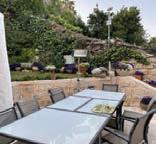

In the heart of BAKA enclosed in a magical courtyard: 3 bedrooms 2 full bathrooms one flight up. Beautiful spacious sukka terrace facing open gardens Completely renovated with architectual design & high level finishes. 6,250,000 NIS
Penthouse near BAKA. 154 sqm on one floor with 4 bedrooms and 2 full bathrooms. Shabbat elevator, 2 underground parking and 3 storage units!!! 25 sqm Sukka terrace off living room plus large roof top terrace. 6,250,000 NIS
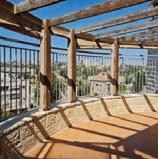
GERMAN COLONY 145 sqm apt. Duplex unit that is 1/3 of a private Templar house. Large salon/dining/ kitchen (open floor plan), 4 bedrooms (2 ensuite on main floor, 2 upstairs), study, 3.5 baths. House is in Tabu, private garden 135 sqm. 11,000,000 NIS
Eta Morris Realty, Ltd. etamorrisrealestate@gmail.com
Eta: 054-723-3863 · Rachel: 052-546-6425 etamorrisrealty.co.il
OU ISRAEL CENTER 25
PROBING THE PROPHETS
BY RABBI NACHMAN (NEIL) WINKLER Faculty, OU Israel Center
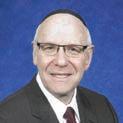
The Chanukah haftarah taken from Sefer Zecharya is one we read twice a year: on Shabbat Chanukah and for Parashat B’ha’alot’cha. Despite our familiarity with the perek in Zecharya, few of us understand the chapter in totality. Because, truthfully, it is a very difficult one to comprehend. In fact, I would suggest that the primary purpose of each haftarah is different – with each reading focusing on a different teaching.
Rav Moshe Lichtenstein provides us with a key to understanding the selection by describing the mood and temperament of the people at that time. The navi Zecharya spoke to those Judeans who had returned from the Babylonian exile and faced tremendous challenges in rebuilding their lives. Beyond the necessary efforts to restore their homes and their very way of life, they were discouraged by their belief that the destruction of the First Beit HaMikdash and their subsequent exile was proof that Hashem had cast them away from Him
NACHI REALTY 054-461-3943
New building under construction in a great location. 3 rooms only 2.47m shekel. 4 rooms available as well from 3.27m NIS
4 rooms on Chizkiyahu HaMelech in Katamon, 2nd floor, beautifully renovated, 2 full bathrooms. 3.49m NIS
– thereby destroying any hope for their forgiveness. Additionally, they faced those surrounding nations who continued to provoke both Israel and their G-d.
For this reason, the haftarah’s opening p’sukim are directed toward these nations who provoked Israel with the claim that Hashem had abandoned and forsaken them. It is in these verses (2: 14-17) that the navi emphasizes how Israel should rejoice for Hashem had, once again, returned to Yerushalayim and to His people. He doesn’t simply repeat the Torah’s promise that Hashem will “dwell in your midst” but, more importantly, he tells the surrounding nations they would know that Hashem has returned and renewed His selection of Yerushalayim.
In the second part of the haftarah, Zecharya’s primary interest is in Israel itself and in their special relationship with G-d –a relationship which remained even after the exile. That lesson is taught through the prophecy addressed to Yehoshua, the Kohen Gadol, and through Hashem’s message to Zerubavel, the scion of the Davidic dynasty and the political leader of the returnees. The message to Yehoshua addresses Israel’s fear that they could not be truly redeemed since that were sinful and undeserving of redemption. The vision of Yehoshua standing with the angel and before the “Satan” mirrors the ongoing “debate” over the possibility of geula. The Satan stands as the
26 TORAH TIDBITS 1497 / MIKETZ 5783
Rabbi Winkler's popular Jewish History lectures can be viewed by visiting the OU Israel Video archive: https://www.ouisrael.org/video-library
prosecutor, opposing Israel’s redemption due to their sinfulness, while the angel –representing G-d Himself – defends Israel and reprimands Satan for daring to attack the few who had just survived a conflagration (“ud mutzal ne’eish”). In doing so, G-d teaches Yehoshua and His nation that the promised redemption will indeed arrive despite the sins, in light of the suffering Israel had endured.
more about patient self-control than physical might. It is found in the Talmudic tractate Kiddushin 40a, where the tale is told about a certain Rabbi Zadok, who resists the attempts of a particularly powerful noblewoman to lead him astray. He exerts moral strength, and to him the Talmud applies the following biblical verse: "Bless the Lord, O His angels, mighty creatures who do His bidding, ever obedient to His bidding. Bless the Lord, all His hosts, His servants who do His will." (Psalms 103:20-21)
The vision granted to Zerubavel – the Governor of Yehuda – is the familiar one that closes the haftarah. It a vision of the seven-branched Menorah that was meant to be a message to Zerubavel and, consequently, to the nation itself, that the political leadership must subordinate itself to the spiritual leadership, for, as the closing words teach us: “lo v’chayil v’lo v’cho’ach-ki im b’ruchi…” - Israel’s strength is not to be found in physical strength but in their very spiritual power.
Isaac's way recognizes the necessity for great patience and forbearance. If we adopt Isaac's way, we must be prepared for a lengthy process before our challenges are resolved. In the words of Rabbi Abraham Isaac Kook, words which have been memorialized in a popular song, "An eternal people does not fear the long and arduous path."
OLD KATAMON - New small building, 3/4/5/6 rooms, good location, garden or balconies, luxury, quiet, storage, parking, starting at 3,600,000 NIS
BAKA - nice 5 rooms, 120m, modern building, elevator, large sukkah balcony, 3 directions, quiet, storageroom, parking, 5,280,000NIS
PENTHOUSE IN KIRYAT SHMUELGreat location, 180m, 5 rooms, large sukkah balcony, stone building with elevator, for renovation, parking,quiet, 7,200,000 NIS
IN THE HEART OF GERMAN COLONYLuxury apartment, 5 rooms, 200m, in a small arabic style building, ground floor, sukkah balcony, beautifully renovated, quiet, 7,800,000 NIS
28, Kovshei Katamon Street, Jerusalem Tel: 02.5633008 - www.ben-zimra.com
Once we comprehend the meaning of Zecharya’s visions, we better appreciate Chazal’s choice for this Chanukah reading. The parallels between Zecharya’s generation and that of the Chashmona’im some years later, are powerful. The Judeans of the Chanukah era, a time of the post-defilement of the Beit Mikdash, miraculously survived their struggle against the Syrian/Greeks and, like their brethren before them, faced the challenge of restoring proper Temple worship of Hashem. It was most tempting for future generations to see the remarkable military success of the Maccabim as the primary reason for the miracle, so our Rabbis established the haftarah of the Menorah o remind them of the message given to Zerubavel: : “lo v’chayil v’lo v’cho’ach-ki im b’ruchi…”
Patience is necessary for those who follow Isaac's way. But a wise woman taught us that patience is but another name for hope. That woman was Jane Austen, who put these words into the mouth of one of the characters in her great novel, Sense and Sensibility: "Know your own happiness. You want nothing but patience—or give it a more fascinating name: call it hope."
May the Torah learned from this issue of TT be in loving memory and נ"על our dear parents whose yahrtzeits are in Kislev Doris Weinberger a"h ולסכ 'ד -ה"ע המלש לאקזחי תב האל הרובד Max Weinberger z”l ולסכ ז"כ -ל"ז בד ןב ךלמילא Greatly missed by their children, grandchildren and great grandchildren Rav Aryeh and Dvora Weinberger Bernie and Leah Weinberger Menachem and Hannah Katten In observance of the Shloshim of our friend Yehuda Leib Berren z"l Rav Menachem Weinberg will give a shiur in his memory "Heroic Joy" Monday evening, 23 November/ 8 Kislev 7:30pm Zoom Meeting: 853 8980 1519 Password: Yehuda
SEALING SERVICES AND ROOFING

OU ISRAEL CENTER 27
OU ISRAEL CENTER 15
SEALING SERVICES Beautiful, spacious 4 room luxury unit, 2.5 baths, 2
elevator, large succa terrace, storage + covered parking. Exclusive! SHELLY LANDAU PROPERTIES LTD & EVA AVIAD REALTY bayitsheli@gmail.com www.aviadrealty.com 052-385-9944
Rehavia-Talbieh on quiet Radak
oor, Shabbat
• 054-499-9043
Unique Nature of Pirsume Nissa of Chanuka
There are three holidays in which we engage in a mitzva whose purpose is אמוסרפ אסינ - to publicize a miraculous historical event that occurred. The first such example is with respect to daled kosot – the four cups that we drink at the Seder on Pesach. The second is with respect to mikra megillah on Purim. The third is in connection with lighting the menorah on Chanuka. Although these three holidays share this common theme, the Shemen Hatov suggests that in each it is manifested in a distinct manner.
On Pesah we are commanded to fulfill the obligation of ךנבל תדגהו – to relay what transpired in Mitzrayim to our children. This form of pirsume nissa is fulfilled in our home, at the Seder table when surrounded by our family.
On Purim, we are commanded to read the Megillah so that we are reminded of the miracles that transpired in the time of Esther and Mordechai. This form of pirsume nissa is fulfilled in the synagogue, among the members of our community.
On Chanuka, we light the menorah to commemorate the miracles that occurred in the time of the Hashmonaim. This form of pirsume nissa is fulfilled in the street, as we place the menorah outside our front door so that all can view it.
We see a progression with respect to the manner in which we spread the message of the miracles that transpired in each of these holidays. On Pesach we focus internally on our family. On Purim, we extend the circle to our community, both by reading the megillah in shul and by sharing mishloach manot with the less fortunate individuals in our society.
On Chanuka, we further expand the scope to the entire world. We seek to spread the light to all of the nations. Perhaps that is why there are two specific halachot that relate to Chanuka candles. The obligation to light candles is not on the individual, but on the house or family. רנ ותיבו שיא. Before we can start to influence others, we need to be certain that we are solid in our foundation. That is why the focus is ner ish u’beto – once our family unit is successful in kindling the light within- then we can be in a position to
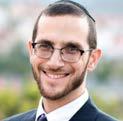
28 TORAH TIDBITS 1497 / MIKETZ 5783
RABBI SHALOM
Rav Kehilla, Nofei HaShemesh Maggid Shiur, Daf Yomi, OU.org Senior Ra"M, Kerem B'Yavneh
ROSNER
Mazal Tov to Ben & D’vorah Gasner and family on the marriages of 2 grandsons and on the birth of a grandson
seek to influence others.
In addition, there is a prohibition on obtaining any benefit from the Chanuka candles, as we recite: שמתשהל תושר ונל ןיאו

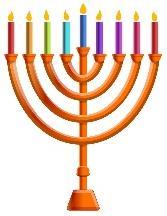

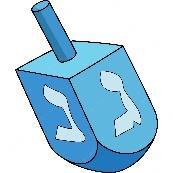
םהב. Perhaps this symbolizes that if one is to influence others, they must do so in a sincere manner, without any hidden agenda or personal benefit. When there is a personal gain, it convolutes the message being transmitted. If we are to seek to transmit kedusha, it has to be sincere with no ulterior motive whatsoever.


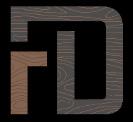


As we celebrate Chanuka, may we kindle our internal light so that we can successfully enlighten others. May we be able to successfully transmit our morals, ethics and Torah values to our family who in turn can then act in a manner that serves as a kiddush Hashem, that will result in having a positive impact on all of mankind.
www.angelrealty.co.il
For Sale in The Village, Zayit, Eftat Stunning 210m 8 room cottage, 2 private parking spots, central A/C. 4,800,000 NIS
For Sale in Dagan, Efrat Stunning 8 room cottage, middle unit. 3 floors, 230m. 5,250,000 NIS
For Sale in Gefen, Efrat Beautiful 5 room duplex garden 2,850,000 NIS For Sale in Dagan, Efrat 5 room garden apt. 120 meters 2,990,000 NIS

For Sale in Olive Project, Zayit, Efrat Gorgeous 4 room apt. 120m. 2,850,000 NIS For sale in Zayit, Efrat 6 room duplex apt. 2,850,000 NIS
Contact Gabi for more info 0524588716
Gabi- 0524588716
Israel’s LEADING and MOST TRUSTED furniture repair company Glue with us once and y ou’ll stick with us forever FIRST TIME EVER CHANUKAH PROMOTION!! 10% off all repairs and purchases from December 11th until December 31st 2022 --------------------------------- RESTORE YOUR FURNITURE TO HEALTH --------------------------------Website: www.thefurnituredoctor.co.il Email: office@thefurnituredoctor.co.il Phone: 02-999-2418 WhatsApp: 058 787 3755 Open throughout Chanukah
REBBETZIN SHIRA SMILES
Faculty, OU Israel Center

Chen of Chanukah
As it happens often throughout the year, there are significant ideas in the parashat hashavua that echo the season in our calendar. These connections allow us to have a deeper appreciation of our chagim, what they represent and what they teach us. The Tosher Rebbe in Avodat Avodah notes one such meaningful interrelation in the brachah that Yosef Hatzadik gave his brother Binaymin when they meet after so many years of separation. Yosef Hatzadik says, “Elokim yechancha b’ni – may G-d be gracious to you, my son.” (Bereisheet 43;29) Rashi notes that the other tribes were blessed with an expression of “chen”, grace, in an exchange between Yaakov Avinu and his brother Eisav. Upon seeing Yaakov’s family, Eisav asks, “Who are these to you?” Yaakov responds, “hayeladim asher chanan
Elokim et avdecha – they are the children whom G-d has been gracious enough to grant me.” (Bereisheet 33;5) Since Binyamin was not yet born and did not receive this special blessing, Yosef Hatzadik bestows it upon him now. The word “yechancha” is etymologically related to the word Chanukah. The miracle of the Jews’ victory over the Syrian Greeks was able to occur only when Am Yisrael achieved this special aspect of ‘chen’. The word “Chanukah” can be understood as a composition of two words, “chanu” and “kah”, as if to say, “they drew down ‘grace’ on the 25th .”
The Tosher Rebbe explains that the brachot of “chen” given by Yaakov Avinu and Yosef Hatzadik instilled this special quality in the Jewish people as part of our spiritual DNA for all generations. However, when a person sins this beautiful spiritual quality is clouded and difficult to access. In the time of the Chanukah miracle the Jews were moser nefesh and proved their loyalty to Hashem. Thus, they were able to
30 TORAH TIDBITS 1497 / MIKETZ 5783
Securities offered through Portfolio Resources Group. Inc., member of FINRA, SIPC, MSRB, SIFMA US BROKERAGE SERVICES IN ISRAEL Get the Best of Both Worlds Keep your money in the US and receive local expert investment advice 02-624-0995 054-599-9530 aaron@lighthousecapital.co.il www.aaronkatsman.com CALL
connect to the brachot of Yaakov and Yosef and reveal this quality to draw tremendous blessing from Above.
The power of Chanukah, the Tosher Rebbe teaches us, is that it brings this quality of ‘chen’ to the surface in all of us. Each person is composed of four primary elements, fire, water, earth, and wind. These elements form the basis of our negative middot - anger, passion, laziness, and frivolity respectively. We are challenged to direct these to serve Hashem in the best way possible.
The fire of the Menorah, which was taken from the altar, symbolizes the power of our inner spiritual fire, the fire that yearns to connect with Hashem and not be drawn to one’s physical passions. Each year, when we kindle the menorah of Chanukah, an extension of the Menorah in the mikdash, we remind ourselves to connect to our inner spiritual fire and overcome the physical temptations that threaten to take over.
As we stare at the light of the Chanukah candles, our spiritual yearnings, the “ner Elokim nishmat adam” within us is aroused. Our ‘chen’, our desire to find favor in the eyes of Hashem and to lead a life of spiritual growth and commitment, is awakened. Chanukah is a time to develop this aspect of finding favor in Hashem’s eyes and in the eyes of others as we yearn to become people whose whole being reflects the brachah of Yosef Hatzadik, “Elokim yechoncha b’ni.”
Eiferman Properties Ltd.
www.eifermanrealty.com
EXCITING PROJECTS, BUILDINGS
Presales and immediate occupancy,
BUILDINGS AND VILLAS
In the most desirable neighborhoods
SHAAREI CHESSED / RECHAVIA
Prime Apartments! Prime Location!
1) Renovated 110 sqm 3 bedroom apt, 1st floor, A/C + underfloor heating, 3 air exposures, succah balcony NIS 6,500,000 2) Beautifully designed 125 sqm 3 bedroom apt + 50 sqm succah balcony. Shabbat elevator, parking and view. 3) Architecturally designed 228 sqm duplex penthouse, 4 bedrooms + 30 sqm succah balcony. Shabbat elevator, parking and a view.
FOR MANY MORE PROPERTIES:
OU ISRAEL CENTER 31
In
entrance 3 exposures, Excellent potential, NIS 4,300,000 HAR NOF * 4 Rooms with building permits, succah, view! * 5 Rooms, renovated, large succah, view! * Shlav B– 200 sqm garden duplex apartment, beautiful kitchen, wrap around garden. OLD KATAMON : * Renovated 3 bdrms including MB en suite, fully furnished, succah and storage! * 4 Bedrooms, duplex penthouse, succah, private elevator. HAR NOF: Central! 4.5 rooms, low floor, elevator, MB en suite, succah, machsan, Immediate! 02-651-4030 FOR SALE - NEW LISTINGS RENTALS JERUSALEM SALES GET FIT WHILE YOU SIT: Exercise for ladies Join us on Sundays 12:45-1:30pm at the OU Israel Center Sura Faecher 0504153239
GERMAN COLONY Beautiful duplex 5.5 rooms, private entrance! OLD KATAMON
a small building, 125 sqm, private
MISCHEL
Chanukah: Lit
The Honorable Yehudah Avner, z’l, was a legendary ambassador, diplomat and political insider. A consiglieri for Prime Minister Menachem Begin, z’l, Avner also filled advisory roles to a gamut of Israeli leaders across the political spectrum, playing an integral role and was present for major decision-making moments that shaped Israel’s foreign policy for more than half a century. Avner was a lifelong activist, a wise, colorful, larger than life personality dedicated to building the State of Israel and ensuring the wellbeing of Am Yisrael. In his trusted role as a perennial insider with prime ministers and other dignitaries, he would often accompany them on trips abroad and meet other world leaders. He met with the Lubavitcher Rebbe many times, and shared the following moving anecdote from one particular yechidus, or private meeting.
Late one night, after more than two hours of intensive conversation on an array of topics ranging from geopolitics to personal matters, I posed a direct question to the Rebbe: “What is it that the Rebbe seeks to accomplish?”
The Rebbe smiled and pointed toward one of the many sefarim shelves in the office. “Yehuda, look there, on the shelf. What is that you see?”
“A candle,” I replied.
“No, no, it’s not a candle,” the Rebbe said, shaking his head, “it is simply a lump of wax with a string in the middle of it… When does a lump of wax become a candle? Only when you bring a flame and ignite the wick does it become a candle.”
The Rebbe continued his point in a Talmudic sing-song: “The ‘wax’ is our body…and the ‘wick’ is our soul; the ‘flame’ is the fire of Torah and Mitzvos. When the soul is lit up by the flame of Torah, achieving the purpose for which we are created, that’s when the person becomes a ‘candle’. This is the goal, to help every man and woman achieve the purpose for which they were created.”
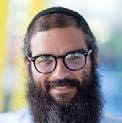
An hour or so later, as the sun was about to rise, the yechidus drew to a close. As I stepped back and out of the Rebbe’s office, our eyes met again, and I asked, “So… has the Rebbe lit my candle?”
Once again, The Rebbe shook his head, and answered in a quiet, serious tone, “No, no…I am only able to give you the match. It is you who must light your own candle.”
In Yidishkeit, the lights we kindle as part of our Divine service are meant to be understood as manifestations of our soul: תמשנ ׳ה רנ םדא “The lamp of Hashem is the soul of man” (Mishlei, 20:27). Furthermore, the letters of שפנ, nefesh, soul, is a roshei teivos acronym of Ner (the kli, vessel), Petil (the wick), Shemen (the oil).
Chazal present specific, demanding
32 TORAH TIDBITS 1497 / MIKETZ 5783
RABBI
Mashpiah, OU-NCSY Executive Director, Camp HASC Author of Baderech: Along the Path of Teshuva (Mosaica 2021)
JUDAH
OFEK ISRAELI






OU ISRAEL CENTER 33 Your journey to medicine starts in Ariel The first international Pre- med academic track (B.Sc.) in Israel! A firm foundation for Medical School. Prepares you for Medical Entrance exams. A three year program. Dorms available at additional cost. Opportunity to learn Hebrew. for more details- Ora Geller +972.39066239 internationalpremed@ariel.ac.il
requirements for the materials that may be used for kindling Shabbos lights. In general, we must use oils and materials for wicks that are of high quality and known to produce a sustainable, clean and constant flame. Bameh Madlikin, the second chapter of Masechet Shabbos, lists oils, fuels and wicks that, due to their inferior quality, are not permitted to be used for kindling Shabbos lights. One of the main concerns is that low-quality materials will not last long enough or the light may flicker, leading one to unthinkingly perform a melachah, a prohibited labor, to correct it once one has already accepted or entered Shabbos.
For the sake of k’vod Shabbos, the flame must draw the oil properly. However, when it comes to hadlakas neiros Shabbos Chanukah, kindling the lights of the Shabbos that falls within the eight days of Chanukah, the halachah reflects a different paradigm. Even oils and wicks that do not burn well may be used.
The first Gerrer Rebbe, Reb Yitzchak Meir, the Chidushei haRim, teaches that the lights of Shabbos and the lights of Chanukah are representative of different spiritual archetypes — different ways that Jews experience Yidishkeit.
Tragically, the majority of Jews don’t yet appreciate the holiness and central role Shabbos holds in our identity, tradition and spiritual role in the world. The radiant and awesome light of the weekly holy day of Shabbos remains a challenge for many to internalize. Therefore, to help everyone understand the light of Shabbos, this light must be channeled through proper wicks and refined oils.
The light of Chanukah, however, has a
quality that resonates with all Jews, regardless of their current ability to appreciate Shabbos. Beyond the universal appeal of a light that banishes darkness, and especially during this season, there are deeper reasons for this resonance.
While there are many opinions on the ideal placement and height of the Chanukah menorah that we use, all agree that the optimal way to achieve pirsumei nisa, publicization of the miracle of Chanukah, is as stated in Shulchan Arukh (671:6): ‘It is a mitzvah to light ones candles within ten tefachim from the ground.’
Chazal explain that the Shechinah, the Divine Presence in this world, never descended below ten tefachim, handwidths. The lights of Chanukah, however, draw the Divine Presence to a level below ten tefachim and thereby illuminate even the ‘lowest’ or most basic regions of our spirituality. This awakens the latent kesher, connection to the Divine, in our heart, no matter what level we may find ourselves on. Even if we feel distant from Jewish practice, are experiencing ‘spiritual burnout’, or sense that our relationship with God has become dim — the light of Chanukah, the light of the inextinguishable essence of the soul, touches the level of nefesh that can remain unmoved by Shabbos.
Shabbos demonstrates that Hashem created the world and everything in it. To live with this recognition is a lofty level. But Chanukah, concludes Reb Yitzchak Meir, is an expression of the relationship Hashem has with Am Yisrael, standing by us even when we are at our lowest point. Every one of us can see and feel this miracle, each in our own way — and light our own ‘candle’.
34 TORAH TIDBITS 1497 / MIKETZ 5783




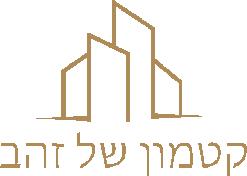
OU ISRAEL CENTER 35 072.394.2557 FOR MORE DETAILS CALL DAVID: COME AND JOIN OUR PRIME LOCATION BOUTIQUE PROJECT "KATAMON OF GOLD" 1-4 bedroom apartments built to a high standard, all with a Sukkah balcony and covered parking.
We are all familiar with the formula proscribed by halacha as to how we are to kindle the Chanuka lights, by lighting one candle on the first night of Chanuka, and adding one candle for each subsequent night, in accordance with the opinion of Beit Hillel, that one must always seek to increase and ascend in holiness, rather than decrease- maalin b’kodesh v’ein moridin.
Most of us associate this principle, and the entire mitzva to kindle Chanuka lights, with the Talmudic account of the nes pach hashemen- the miracle of the small jar of oil that the Chashmonaim found hidden away, which burned for eight days instead of one.
It is interesting to note that there is an alternative version of the story of Chanuka which appears in the early rabbinic/ midrashic collection known as the Pesikta Rabbati. In this account, upon entering the Beit Hamikdash, which was defiled by the Greeks, the Chashmonaim find not a small jar of oil, rather shmoneh shipudei barzel- eight iron spears, which they bound together as a makeshift menora and lit eight lights within this makeshift menora.
In this version of the story, the
BY RABBI SAM SHOR Program Director, OU Israel Center

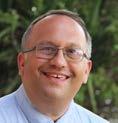
Chashmonaim find the Beit HaMikdash in a complete state of impurity, and even the menora was either destroyed or rendered impure and unusable. In that challenging moment, rather than despair, they found those eight iron spears, weapons that had been used for destruction and harm, the spoils of war, and bound them together to restore light and holiness within the walls of the Beit HaMikdash ,and the entire world.
Perhaps this depiction of what transpired when the Chashmonaim re-entered the Beit HaMikdash, is an even stronger illustration of the halachic principle of maalin bkodesh v’ein moridin-taking those weapons, those vessels intended to cause harm, and elevating those very vessels into something sacred, to become the conduit to restore the lights of holiness both within the Beit HaMikdash,and subsequently the light that lives on through each of our chanukiot as well.
Ultimately the yom tov of Chanuka is meant to inspire each of us to look at the world through the proverbial lens of maalin bkodesh vein moridin- to emulate the Chashmonaim and seek opportunities to transform that which might be mundane or even profane, and elevate those very items and circumstances and make them sacred.
36 TORAH TIDBITS 1497 / MIKETZ 5783
SIMCHAT SHMUEL MASSAGE THERAPIST & FITNESS TRAINER 052.673.3704 I www.andyhealth.com | jerusalemmyhome@hotmail.com TUVIA ANDY HAAS BALANCE and FALL-PREVENTION SPECIALIST for OLDER ADULTS Maintain Healthy Bones and Muscles Decrease Stiffness and Joint Pain Increase Strength! Stay Independent!
Indeed Rabbi Moshe Wolfson,shlita, in his beautiful sefer, Emunat Itecha, teaches that the very word Chanuka, is an acronymChet(8) Kohain, as we kindle our candles throughout the eight days of Chanuka each of us is a proverbial Kohain, each of has the ability to lift up the entire world through the sacred lights of our chanukiot. May our Nerot Chanuka, inspire each of us to see the great opportunities that exist each and every day to experience growth and transformation, to sanctify the mundane and profane, maalin bkodesh v’ein moridin....Chanuka Sameach!





OU ISRAEL CENTER 37
Ilana Nelson 054.5341403 www.integrityrealestate.co.il FOR RENT LOVELY, BRIGHT 3 RM APT #4 TCHERNICHOVSKY ST 85 M, WHEELCHAIR ACCESSIBLE FURNISHED WITH APPLIANCES 3RD FLOOR WITH ELEVATOR, IMMEDIATE 6500 NIS NEW RENTAL IN THE HEART OF SHAAREI CHESED IBN EZRA CORNER OF KKL 95 M, 4 ROOMS 1ST FLOOR WALK UP IMMEDIATE ENTRY TRANSFER YOUR OLD FILM/VIDEO's (All formats) In Quality to Digital Preserve Family History from Fading Michael 052.286.8626 Photography with feeling Facebook.com/L'Dorot Photography


38 TORAH TIDBITS 1497 / MIKETZ 5783



OU ISRAEL CENTER 39

40 TORAH TIDBITS 1497 / MIKETZ 5783

OU ISRAEL CENTER 41

42 TORAH TIDBITS 1497 / MIKETZ 5783


OU ISRAEL CENTER 43

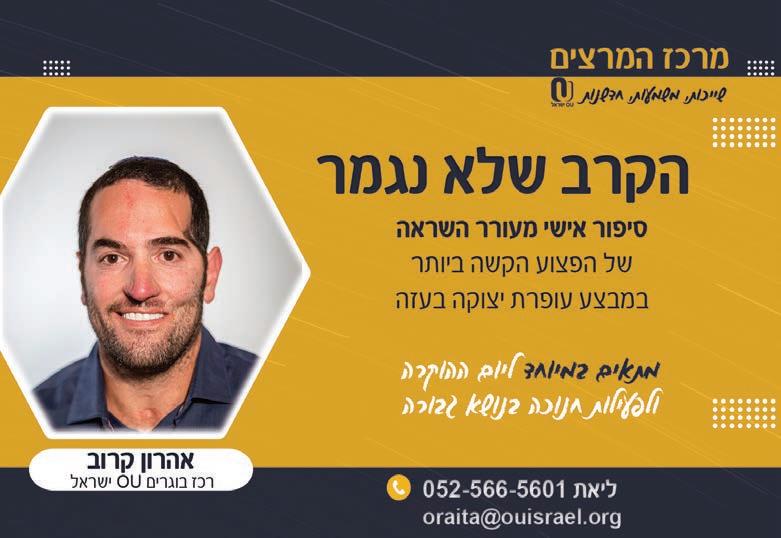
44 TORAH TIDBITS 1497 / MIKETZ 5783 Wednesday, December 28th, 7:30pm How to work effectively with the new Knesseteven in English with David Bedein, community organizer and investigative journalist OU Israel Center, 22 Keren Hayesod, Jerusalem PRI HADASH WOMEN'S WRITING WORKSHOP AT THE OU ISRAEL CENTER Monday mornings 10.30-12.30 For more details, call Ruth 02-628-7359 or Judy 054-569-0410
Real Life Rescues

A Baby Suffered a Severe Anaphylactic Reaction Saved by EMTs in Beit Shemesh
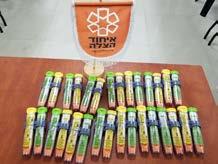






On Thursday afternoon, a two–year–old baby who lives with his family on Ben Hanan street in Beit Shemesh, came in contact with food to which he is allergic. The baby started to develop a harsh allergic reaction and the worried family called emergency services for help.




Shlomo Kap, who is a United Hatzalah EMT, was at his work - a private ambulance company when his proximity alert went off alerting him to the anaphylactic reaction. Shlomo immediately left and drove one of the private ambulances to the scene.
Arriving as the first responder at the incident, Shlomo found the baby all swollen and having difficulty breathing. The baby had a rash on his body and Shlomo saw that the anaphylactic reaction was quite advanced and that the situation was life or death.
The baby’s father told Shlomo he had an EpiPen auto-injection device on him but he was unsure of how to inject it into his child and was scared to do it himself. Shlomo took the EpiPen and injected it into the baby’s thigh. A few moments went by and the baby’s swelling receded and he could breathe more easily. An intensive care ambulance arrived sometime later and transferred the baby to the nearest hospital.
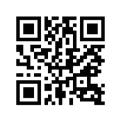
After the incident ended, Shlomo recounted; ‘’I've been an EMT for a few years now, and nothing is more moving and fulfilling than saving a life. It can be scary for people when they’re faced with providing medical treatment. That's why it's so important to learn first aid treatment and have trauma kits and EpiPens in every house. When treating anaphylactic reactions the situation can be life or death like it was today. For anyone who has serious allergies, it's important to have an EpiPen and know how to use it because it saves precious time and can save a person's life.’’

OU ISRAEL CENTER 45 The OU Israel Center is looking for a FULL TIME EXPERIENCED MAINTENANCE WORKER 1. Must be dependable, efficient and possess a solid work ethic 2. Must be able to handle necessary maintenance and repairs including basic electricity and plumbing issues 3. Must be able to handle the physical demands of the job 4. At least one year experience in building maintenance 5. Valid driver’s license a plus To apply, please contact David Katz at 02-5609123 or dkatz@ouisrael.org לארשי ץראל עסמה לארשי ץראל עסמה
1221

46 TORAH TIDBITS 1497 / MIKETZ 5783
LIGHTING for תבש


It is preferable to daven Mincha before lighting Chanukah candles, but one should not miss out on a minyan to daven before lighting. Chanukah candles should be lit BEFORE Shabbat candles - even if different people are lighting each. Count on 5-10 minutes before the posted Shabbat lighting time; adjust according to your household’s experience.
IN JERUSALEM...
Some follow the practice of delaying Shabbat candle lighting for 20 minutes and lighting Chanukah candles right before Shabbat candles. For other cities where candle lighting is 30 min. before sunset one should ask his/her local Rav.
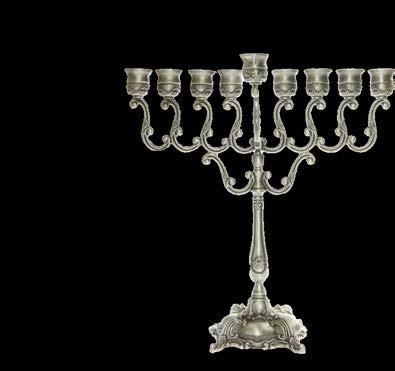
OU ISRAEL CENTER 47
and CANDLE LIGHTING The general practice, when lighting at home, is to say Havdalah before lighting the menorah.
HAVDALAH
" " " With over 30 years of experience, Tracey connects deeply with her clients and their families, helping them find growth, inspiration, and direction" If you're looking for a counselor who
“Working with Tracy I never felt alone” Call Tracey for a free phone consultation at 0548108918 or by email traceyshipley125@gmail.com www.Jerusalemteencounseling.net Quote from a parent: Quote from a teen client: ...המלש האופר • Miriam Tovah Chaya bat Chanah Elisheva Rivka •Yosef Ezriel ben Chaya Michal הלחמ ןב ןתנוהי • רתסא ןב המלש • לזייר הניס ןב ץרה ילתפנ • הכרב הנח ןב השנמ םהרבא • • Esther Fruma bat Baila • Yisrael Leib ben Chana
Tracey ShipleyTeen Behavioral and Addiction Counselor
provides smart, practical advice, then speak to Tracey. She gives you tools, not theories.”
Be’er Tziporah a"h - Bottled Water Gemach
Walking down King George St. in Jerusalem and want a cold bottle of water? Come help yourself to a bottle at 52 King George. In loving memory of Yoni’s wife Tziporah a"h, a true Eishes Chayil, always full of chessed, kindness and laughter, and brought life and strength to so many people, that she touched! She was like Aron, who loved peace and pursued peace. Yoni thanks Hashem for having the opportunity of having Tziporah in his life, to learn of her caring, patience and happiness, to overcome her challenges. May Tziporah's Neshama be a light onto the world, in a time of darkness, and may her Neshama shine to Gan Eden. Yoni misses Tziporah with tears in his eyes, as Hashem gave him a gift, a crown jewel, now he returns her to Hashem. With thanks and Toda. Love, Yoni
To help refill the supplysend tax deductible donations for Be’er Tziporah a"h Bottled Water Gemach to Chabad of RechaviaRabbi Yisroel Goldberg email Rabbi@JerusalemChabad.org
SHIUR SPONSORS

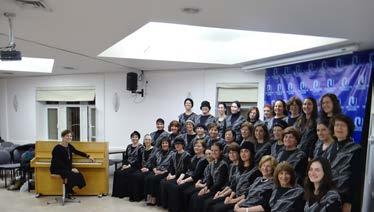
z”l - ל”ז יולה רטלא היעשי ןב דוד םייח ז”עשת ולסכ ז”כ רטפנש
Monday, December 19th - Rabbi Goldscheider’s Chanukah Shiur was sponsored by the Hisler Family L’illuy Nishmat our beloved parents Devorah bas Avraham v’Chaya Sara a”h whose yahrzeit fell on 16 Chesvan, November 10, 2022 and Avraham ben Sender v’Malka whose 20th yahrzeit falls on 22 Tevet, January 10, 2023
Sunday, December 25th - Rabbi Breitowitz’s shiur is sponsored in memory of Dr. Jason WolfeYosef Shimon ben Avraham Isaac & Rivka z”l on his 8th Yartzeit
Monday, December 26th - Pearl Borow’s shiur is sponsored in memory of our dear mother, Molly Tobiansky Andelman - ה”ע החונמו אנאח תב הכלמ on her 14th yahrzeit - December 27 - פ”שת תבט ג by Dov and Elayne Greenstone
Rebbetzin Shira Smiles shiur is sponsored for the 2022 academic year by Dr. & Mrs. Menachem Marcus in memory of their parents Rose & Dr. Emanuel Marcus ןב יכדרמו ריאמ ףסוי תב לזייר ל”ז סוקרמ השמ and Rosi & Ernest Strauss ל”ז סוארטש דוד ןב לאינדו םהרבא תב דומיל
Rabbi Goldin’s shiur is sponsored for the 2022 academic year by Dr. & Mrs. Menachem Marcus in memory of beloved aunts Irma Haas a”h and Hilde Myer a”h
Rabbi Manning’s shiur has been sponsored for the 2022 academic year ל”ז ןמלק ןב גילזו ה”ע תידנב תב הנרב תמשנ יוליעל
Rabbi Kimche’s shiur has been sponsored for the 2022 academic year ל”ז המלש ןב בוט םשו ה”ע םהרבא תב םירמ תמשנ יוליעל
Rabbi Taub’s weekly Thursday Parshat HaShavua Shiur is sponsored by The Jewish Legacy Foundation
Rabbi Breitowitz’s Sunday shiur for the 2022 academic year has been sponsored in Loving Memory of Rachel bat Yehuda Aryeh & Hensha a”h

48 TORAH TIDBITS 1497 / MIKETZ 5783
02
www.JerusalermChabad.org/DonateShekels בוט יכ 'הל ודוה DOROT - The OU Women's Intergenerational Choir Director Hadassah Jacob 052-384-7230 Monday Evenings 7:00 - 9:00pm Gemach for Chatan and Kalla: Meals for wedding and Sheva Brachot at cost Eida Hachareidis Hechsher Tel:052-633-1744 gadgadood@gmail.com
800-1717
was
יוליעל Herb
Monday, December 19th - Rebbetzin Pearl Borow’s shiur
sponsored by Noni & Eddie Weiss תמשנ
Sunshine


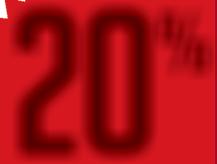


OU ISRAEL CENTER 49 20% OFF 8 DAY HANUKKAH SALE grand opening Dorot Rishonim 3 • 02-563-7155 Web: SherlockSHats.com KING GEORGE BEN YEHUDAH DOROT RISHONIM 3 Muffins, Coffee, Daily Raffle
GEULAS YISRAEL
BY RABBI MOSHE TARAGIN R am, Yeshivat Har Etzion
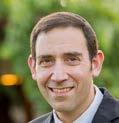
Chanukah: Lost Jews
The Chanukah miracle surrounding a lone flask of oil showcased just how deplorable the devastation was in the ransacked Mikdash. The Greek armies had torn thirteen breaches in the gates of the Mikdash compound and had vandalized its contents. The Maccabees returned to a dreadful scene of destruction and demolition. In addition to contaminated oil, stones of the mizbeach had been defiled, and the defaced altar had to be reconstructed. Euphoric from their military victory, the returning heroes encountered hideous devastation and painful desecration.
The navi Yechezkel had already forecasted this situation. In perek 7 he forewarned והוללחו םיצירפ הב ואבו, depicting the entry of criminal intruders who would defile the Mikdash and divest its components from halachic kedusha.
It is unclear how the kedusha or halachic holiness was removed from these stones of the mizbeach. Typically, Mikdash-associated items, known as hekdesh can only lose their kedusha through a violation known as me’ilah. Repurposing a hekdesh item for personal benefit, or legally removing it from the jurisdiction of the Mikdash,
violates the prohibition of mei’lah, and also empties the hekdesh article of its kedusha.
Like most prohibitions, me’ilah does not apply to Gentiles, and therefore, their illegal use of hekdesh would not affect the resident kedusha of these items. If a Gentile cannot violate me’ilah, he cannot hollow hekdesh items of their kedusha. How did the stones of the mizbeach lose their kedusha? This halachic question is debated by commentators in their analysis of the gemara in Avodah Zarah (52b).
Jews, not Gentiles
Among the many explanations to this riddle is a depressing opinion asserted by Rabeinu Zerachaya Halevi, the 11th century French Rishon, better known by the sefer he authored named the Ba’al Hama’or. He claims that the marauding Greek invaders were accompanied by Hellenized Jews who misused these mizbeach stones for their own Hellenist ceremonies. As these trespassers were Jewish, and subject to the rules of me’ilah, their abuse of the stones discharged their halachic kedusha. Yechezkel alluded to this disaster by referring to these invaders as “perizim” connoting rogue criminals and not actual Gentile vandals.
This account of disloyal Jews tampering with the Mikdash symbolizes the tragedy and triumph of Chanukah. Facing off against Hellenized Jews was an entirely new challenge.
50 TORAH TIDBITS 1497 / MIKETZ 5783
A Clash of Civilizations

There were two unfamiliar aspects to our cultural faceoff with Athens. Prior to the golden era of Greek expansion, humanity lived in scattered tribes strewn across distant locales and divided by disparate cultural norms. No one culture had established political or cultural supremacy in this all-against-all theater of survival. Moreover, humanity had yet to establish enlightened forms of government, scientific advancement, or philosophical inquiry. These backward cultures weren’t progressive or enlightened but barbaric and bellicose.
All this changed rapidly with the ascent of Alexander the Great. Beginning in 336 BCE he conquered wide swaths of land, creating one of the largest empires of the ancient world, stretching from Greece to northwestern India. This entire region fell under Greek military control and, more significantly, under Greek cultural influence.
There was a lot to admire about this culture. Ancient Greece was the first nation to establish a “civilization”, crafting a rudimentary democracy and founding the first enlightened political system. Greece was first to methodically apply the tools of science to better advance human progress and to tame an otherwise random and unpredictable world. The Greeks began to explore the larger questions of G-d, morality and human existence while also creating a rich cultural tapestry of art, architecture, literature, and theater.
This posed a major test for Judaism, which in the past, had confronted barbaric societies which could not compete with Judaism’s well-designed and comprehen-


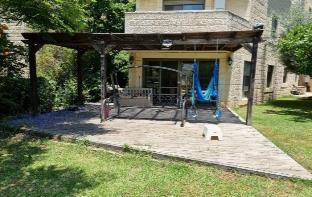

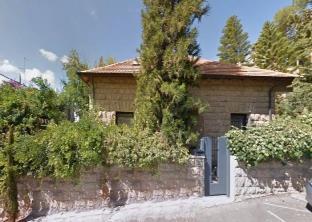
OU ISRAEL CENTER 51 Amazing Penthouse #052-6984466 9 R | 6 BR | 340 SQM | 6 B | 2 floors | 2 terraces with views | 4 parking spaces | 2 storage units In the heart of Old Katamon #052-2670008 5 R | 150 SQM | elevator | parking | balcony spacious & bright | 6,900,000 NIS Arnona #050-7225694 8 R | garden | balcony | renovated | accessible spacious living room | separate unit Gilinski Real Estate gilinski.co.il
Thank you to all of our devoted friends and donors who contribute to the Fund and help over 200 poor and needy families to enjoy Shabbat and the Holidays. Best wishes to all for a healthy winter and a Happy Chanukah! Send your contributions to the Clara Hammer Chicken Fund P.O.B.18602 Jerusalem 91185 (02)5810256 Donate via PayPal at Chickenladyofjerusalem.com !אירב ףרוחו חמש הכונח
sive approach to life, religion, and society. This was the first time Judaism faced off against a “worthy opponent”. It had a very different feel from past encounters
Saboteurs
There was an additional “new” element to this confrontation. In the past, we had faced two types of enemies. We had confronted foreign autocrats who enslaved us, attacked us, or attempted to annihilate us. We defeated all these would-be despots from Pharo, to Balak, to Nevuchadnezzar, and to Haman.
During the period of the first Mikdash we also faced the curse of malevolent Jewish kings who murdered and worshipped pagan deities. However, despite their abhorrent and decadent behavior these wicked kings still viewed themselves as part of our collective Jewish destiny. Lacking the strength of character to practice pure monotheism, they assigned divine spirit to intermediate idols. They believed in Hashem, but they also believed in their own desires, their own egos, and their own more accessible gods.
We were familiar with foreign tyrants and impious Jewish kings. We weren’t prepared for internal defection.
As Greek influence spread, large groups of Hellenized Jews looked to Athens for a cultural model to replace our Jewish culture. This was the first time we faced an internal crisis where our own people questioned Jewish identity, culture, and destiny. Strictly legally, it may have been possible to synthesize Hellenism with halacha, but Hellenism still threatened to gut us of our historical and cultural identity. This was the first time we faced internal sabotage,
but certainly not the last.
Soon after the Chanukah period we were, once again internally split, this time by the emergence of factions which denied the authority of Torah sheba’al peh. Chief among these factions were the Sadducees, who were far more successful than the Hellenists in infiltrating every sector of Jewish society from the political sphere to the offices of the High priest. Even after the Sadducees went extinct in the 1st century, their spiritual descendants, the Karaites, perpetuated their legacy of denying the oral tradition and splintering the Jewish community from within. Denying Torah sheba’al peh is just as emasculating as Hellenizing Jewish culture, as they each strike at the heart of Jewish identity.
Our firm resistance to Hellenism provided a model for future internal rifts. As history unfolds, we may adapt parts of our surrounding culture, but we cannot replace core Jewish identity, or core Jewish practice, and we certainly must uphold the integrity and authority of Torah sheba’al peh.
No Unifying Narrative
Ultimately the Hellenists, the Sadducees and the Karaites seceded from mainstream Judaism and faded from history. Sadly, there was no larger unifying narrative capable of retaining these factions within Jewish destiny. Had there been a larger narrative to bond us, these groups, despite their divergent ideas, may have remained within Jewish history. Incorporated within Jewish history, they could have rejoined Rabbinic Judaism, once their corrupting ideas were defeated. Unfortunately, the sorry state
52 TORAH TIDBITS 1497 / MIKETZ 5783
of our union and our weakened national identity during the second Mikdash were each too brittle to incorporate deviant factions. Once Hellenistic ideas veered away there was no longer much common ground between a Hellenist and a mainstream Jew. When we were exiled from Israel the situation became more acute, as Jewish identity became defined primarily based upon religious identity. Rejectionists of Torah sheb’al peh shared little in common with Rabbinic Jews
Will We Succeed Where They Failed?
In the modern era we are facing a similar crisis. Over the past two hundred years different Jewish movements have challenged traditional models of Jewish culture and of Rabbinic authority. Radical secularization has reshaped the cultural foundation of Judaism and outright rejection of Rabbinic authority has subverted the authority of our halacha. These changes must be firmly resisted.
Will we lose these Jews to history? We do have one advantage over our ancestors. We possess one common unifying narrative, and it is called the proud State of Israel. We have jointly returned to our Homeland after thousands of years to rebuild our people and resettle our Land. We face international opposition, but we face it together. This compelling narrative unifies Jews who have little else in common. Let’s hope we don’t waste this historical moment. Let’s hope that this historical project remains the common province of every Jew. Let’s hope we will be more successful in retaining every Jew for our common destiny. It is easier to lose them than to preserve them. No more lost Jews.
CHANUKAH CAMPAIGN

The Goal: NIS 50,000 Help Light up Chanukah for the Needy!
“I was on drugs and depressed, and Yesh Ezra’s care saved my life.”
– David Garbion. You can save lives too!

• Checks: Make out to “Yesh Ezra” Send to: Yesh Ezra, POB 36156, Romema, Jerusalem

• Bank Transfer: Bank Mercantile (17), Branch 642, A/C 79747843, Yesh Ezra



• Credit card by phone: Sara at 077-820-0196 (Sun-Thu. 10:00am-3:00pm)
• Website: www.yeshezra.org Click on “Donate Now”
Inquiries: Menachem Persoff 050-570-1067 menpmp@gmail.com


OU ISRAEL CENTER 53



54 TORAH TIDBITS 1497 / MIKETZ 5783 GOOD DEAL!!! In New TALPIOT – Spacious 2 rooms, 50m, recent, Shabbat elevator, terrace, calm, store-room, parking 2000000 NIS - MENDEL 052-8980111 VERY GOOD INVESTMENT!! In Bustan BakaIn a beautiful boutique building –Large 2 room apartment, ground floor (0 steps), elevator, balcony, parking 2450000 NIS - MENDEL 052-8980111 TALPIOT HAYESHENA – In a new project, 4 rooms, 100m, elevator, balcony, occupancy in 2 years, from 3400000 NIS MICHAEL 052- 3202488 FOR RENT / for SALE!! In the heart of BAKA, in an Arab house and a pastoral street - Garden apartment 4.5 rooms, spacious, lots of storage space, partially furnished, garden, 60m) 5500000 / 8700 NISMICHAEL 052-3202488


OU ISRAEL CENTER 55 A new project in Jerusalem! No apartment purchase or purchase taxes involved! Guaranteed returns 27 year track record Strong securities 3 year investment program Very low risk 3 year Call our investment expert Moshe Ehrlich today to hear about our latest investment opportunities! Invest@bemuna.co.il www.bemuna.co.il 050-551-3221 Buying an apartment for an investment is looking complicated because of the increasing interest rates? הנומאב ריע הירומה A safe alternative for your investment funds! Invest with MAXI BoX 053-7272-815 ד״סב Storage Your place for extra space Flying Soon? Travel with Confidence 1UniTravel - Medical Insurance at great prices Choose from multiple options 1unitravel.brokersnexus.com 1UniSim - Sims for USA and Worldwide Starting at $40 sales@1unisim.com Call 077-400-3199 or USA 718-715-0001 054-527-9356 DIRTY AIR, DAMP & MOLD GREEN TREATMENT EXPERTS - Corona Cleaning - Deodorization - Leak Detection Systems - Waterproofing - English + Hebrew Reports - Working at heights - Insured - Quality House Painting QUICK ESTIMATE/FREE ADVICE :)
Hashem is In Charge!
Sometimes, we might look at the Parsha in the same way we enjoy an enthralling thriller or captivating play. Indeed, we might get to analyze a verbal exchange between two “actors” in a biblical scenario as we might pounce on every word of a Shakesperian dialogue.
Traditionally, however, we hold that every word and phrase in the Torah is pregnant with meaning; no term is redundant. Consequently, we should probably invest more profound significance and levels of understanding in representations expressed in the biblical narrative than we do when exploring dramatic interludes and literary devices in secular texts.
So let us look at Yosef’s interactions with his idol-worshiping associates in Egypt. First, Yosef is a weak and lowly Hebrew slave, an alien in a foreign land with no status whatsoever. With ease, he could have assimilated; who would have known?
But no! Yosef repels Potiphar’s wife, proclaiming he cannot sin against God. He informs his prison mates that dream interpretations belong to God. And in his parley with Pharoah, Yosef invokes Hashem no less than four times, each time – observes Nechama Leibowitz – at a strategic part of
BY MENACHEM PERSOFF Special Projects Consultant, OU Israel Center menpmp@gmail.com
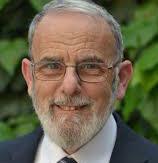
his address.

Yosef intimates to Pharoah, unabashedly and without assertiveness, that Hashem is the One who controls events. He is the One who sends messages through dreams; He interprets them, foretells what is to come, and “He will surely bring it to pass.”
Like Yaakov, who persuaded his wives and handmaids to return to his homeland, and Moshe, who convinced the two-andhalf tribes to join the military excursions into Canaan, Yosef, in his discussion with Pharoah, subtly introduces Hashem. Through rhetoric and repetition, Yosef finally influences an idol-worshiping king to recognize Hashem’s divine providence and mastery of events.
Notably, it used to be politically correct when talking to our non-observant or lesslearned compatriots, NOT to mention God! – The argument went that we shouldn’t come over too “frum!” Indeed, we might deter our friends by stepping into forbidden territory!
But now, if Yosef can talk about Hashem to a pagan, should we not be proud to do so among ourselves? We might then glorify Hashem’s name in this world and bring Nachat Ru’ach to our Father in Heaven. Like Yosef, we might also make our (modest) contribution toward the Tikkun that will bring the Ge’ulah closer to reality –speedily and in our days.
Shabbat Shalom.
56 TORAH TIDBITS 1497 / MIKETZ 5783
DIVREI MENACHEM
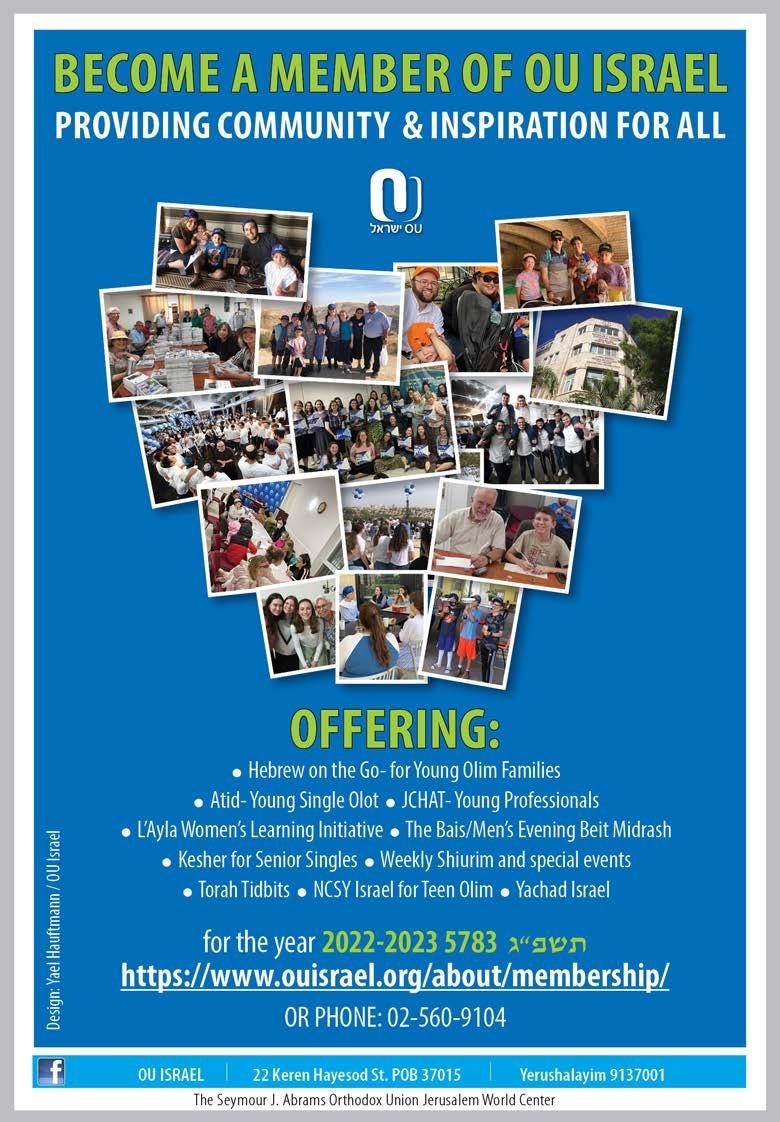
OU ISRAEL CENTER 57
‘Secrets’ Help To Realize the Redemption
“The secrets of Torah bring the redemption and return Israel to its Land, for the Torah of Truth, with the strength of its inner logic, demands with its broadening the whole soul of the nation, and through it, the nation begins to feel the pain of the Exile, and how it is utterly impossible for its character to be actualized, as long as it is oppressed upon foreign soil.” (Eretz Chefetz 2:9)
Secrets
Rav Kook’s assertion that ‘knowledge of the secrets of Torah’ is an essential ingredient in actualizing the return of the nation to the Land of Israel needs to be understood.
1. Perhaps a starting point for this is the dramatic story of Rabbi Akiva’s reaction when he witnesses the ruins of the Temple.
The Talmud (Makot 24b) describes the group of sages who upon seeing the desolated mount of Har Habyit tore their garments in mourning and when they beheld a fox running out of the area where the Holy of Holies once stood, they began to cry. At that same moment Rabbi Akiva somehow smiled and joyously laughed.
How are we to understand Rabbi Akiva’s response to this heart-wrenching site?
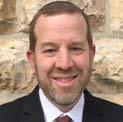
The classic commentator, Maharsha (Chiddushei Aggadot, dibur hamatchik: lekach) suggests that at that moment Rabbi Akiva was struck by the singular bond that the Land of Israel has to her nation. No other nation, other than Israel, will ever find a home or tranquility in the Land. When he saw a fox roaming on the Har Habayit he saw the verse of Micha (3:13) come to fruition: “Zion will be plowed over as a field.” Animals will wander in its ruins. A symbol that the Land will wait, as long it may take, for the nation to return.1
Rabbi Akiva’s faith in the future was motivated by a belief in what is called sod, in a ‘secret’ not apparent to the eye or always rational.

Rabbi Akiva’s unique outlook in the above episode was based on a Torah verse which requires a deeper explanation than merely a straightforward reading. “And I will bring the Land into desolation”
1 It is worth noting that Rabbi Akiva is consistently able to see a deeper and hidden potential and the hand of God. The episode with the lantern and donkey which were lost to him and he then exclaims that: “It is all for best” personifies this trait.
58 TORAH TIDBITS 1497 / MIKETZ 5783
RABBI AARON
Editor, Torah Tidbits
GOLDSCHEIDER
(Vayikra 26:32). Rashi, basing himself on the Sifra, comments on this verse: ‘This is a good dispensation for the Israelites, for the enemies will not find any gratification in their land, since it will be desolate of its inhabitants.’
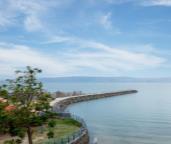

Rabbi Joseph B. Soloveitchik in a famous address entitled Kol Dodi Dofek commented on the aforementioned verse: “The Land of Israel cannot be built by just any people or group. Only the Jewish people possess the capacity to transform it into a settled Land and to make the desolate waste bloom. The divine promise became a miraculous fact in the history of the Land of Israel during various periods.” (Kol Dodi Dofek, p.77)
Mashiach
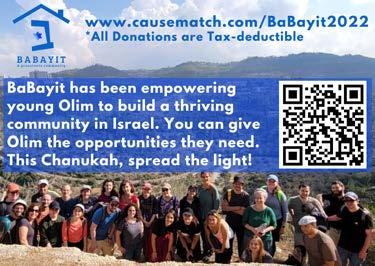




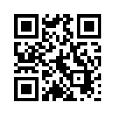


2. Rav Kook’s assertion that the return to Israel is predicated on loyalty to the inner dimension of Torah may be understood from the following perspective as well. The Rambam counts the belief in the coming of the Mashiach as the twelfth tenant of his ‘Thirteen Tenets of Faith’ : “I believe without reservation in the coming of the Mashiach. Even though he may delay, nevertheless, I anticipate every day that he will come.” This fundamental principle is not stated verbatim in the Torah. Its source is somewhat oblique when searching in



OU ISRAEL CENTER 59
the text of the Torah. Its source requires one to access a deeper layer. Perforce, we enter an area of Torah wisdom that is more “secretive.”
The first description in the Torah of the theme of exile and redemption is an episode that itself is quite enigmatic and mysterious: The prophecy to Avraham at the “Covenant Between the Parts.”, God tells him: “Know with certainty that your offspring will be strangers in a land that is not theirs, and [its inhabitants] will enslave and oppress them for four hundred years” (Bereshit 15:13).
The Midrash elaborates on the doubled Hebrew verb Yadoa Teda (‘know’) in this verse: Yadoa (‘know’) that I will disperse them, teda (‘know’) that I will gather them; Yadoa (‘know’) that I will mortgage them, teda (‘know’) that I will redeem them. Yadoa (‘know’) that I will enslave them, and teda (‘know’) that I will liberate them” (Bereshit Rabbah 44:18).
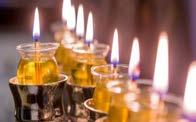


A question raised on this midrashic teaching: Does the verse not state explicitly: “and afterwards they will leave with great wealth?” What then is added in this teaching?
The Maharal of Prague interprets this









Midrash in Netzach Yisrael (Chapter 1). The double verb, he explains, is meant as a cause and effect. By knowing the unnaturalness of their servitude, you, Avraham, will realize that their redemption is inevitable. For whenever the natural state of an object or a situation is inverted, it can remain that way only temporarily. Ultimately, it must return to its natural state, for no aspect of nature can permanently change its nature. Now, the system of nation-states that exists on earth was designed by God as the natural state of events, so that each nationality has its own land in which it lives as a sovereign people. For the Jewish people, the land is the Land of Israel.




















Rav Kook advances this same theme in his commentary Ain Aya regarding a perplexing episode found in the beginning of Tractate Berachot (3a). Rebi Yosia once entered an abandoned building among the ruins of Jerusalem in order to pray. Eliyahu the prophet miraculously appeared to him. Eliyahu engaged him in a discussion and gave him instruction. Eliyahu then asked, “What voice did you hear in the ruins?” I answered, “I heard a Heavenly voice, cooing like a dove and saying:

60 TORAH TIDBITS 1497 / MIKETZ 5783
WE WISH EVERYONE CHAG CHANUKAH –SOMAYACH-SIMCHA-SHALOM-TOVIM-BROCHA-ALWAYS NEVE SHAMIR –NEW PROJECTS HIGH DEMAND 3,4,5 ROOMS GARDENS AND PENTHOUSES LIMITED TO 3 PER PERSON FROM 1.950,000 NIS www.israel-properties.com| Tel/WhatsApp IL +972 50 446 9515 | Office +972 2 568 6578 | toviyah@israel-properties.com NETANYA -PRE SALE NETANYA STUNNNING 4 ,5 ROOMS CLOSE TO IR YAMIM ALL WITH SUKKAH BALCONIES FROM 2.3 MILLION NIS HADERA – PRE SALE 4 ROOMS 98 M2 WITH 14 M2 BALCONIES NIS LIMITED OFFER NO MADAD 5 MINUTE DRIVE TO BEACH FROM 1,790,000 NIS NEVE SHAMIR NEW PROJECT HIGH DEMAND CLOSE TO ALEPH AND MISHKAFAYIM 3,4,5 ROOMS HIGH LEVEL FINISHES HURRY CONTACT US TODAY FROM 2,180,000 NIS R’ANANA - PRE SALE NEW HIGH LEVEL PROJECT – SPACIOUSE UNITS CLOSE TO ALL AMENITIES NEIGHBERHOOD VARIOUSE OPTIONS CONTACT US TODAY TIBERIAS - PRE SALE LAKE VIEWS OPTION TO HAVE PRIVATE POOL 3 ROOMS 4 ROOMS GARDENS AND PENTHOUSES FROM 1,800,000 NIS Toviyah +972 50 446 9515, Daniel +972 53 444 0928 , Lara +972 58 661 1968, Yehudah +972 52 564 0130, Debbie +972 58 322 9858
Woe to the children, due to whose sins I have destroyed my house, burned down my Temple, and exiled them among the nations.”






Rav Kook is suggesting that the description of God in pain can be compared to a physical malady that eventually, over time, is healed. Pain signals that something is off kilter, a part of the structure has been dislocated. In a similar way, the Jewish people’s presence in the exile is destined to be rectified. In God’s creation, the Jewish people’s natural and rightful place is in the Land. Nature is a powerful force. The Jewish people's return to its divinely ordered assignment and setting is inevitable.


We, in our generation, are enormously blessed to see this aspiration being actualized. May God continue to guide Israel and its people towards the Geulah Shleimah.






OU ISRAEL CENTER 61
is a pleasure to work
“TzviAir
with and did an amazing job!”
AIR CONDITIONING SALES & SERVICE 02-628-8282 | tzviair.com
– Jamie Geller, Celebrity Chef
FROM THE VIRTUAL DESK OF THE OU VEBBE REBBE
 RAV DANIEL MANN
RAV DANIEL MANN
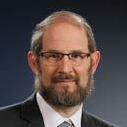
When a NonJew “Clicks” a Door Open on Shabbat
Question: My shul has a guard station near the entrance. The non-Jewish guard has instructions that, on Shabbat, he should get up to open the door for people manually. Sometimes he electrically clicks the door unlocked. When that happens, may I enter, or should I wait for him to get up and open the door?
Answer: A Jew may not benefit from melacha done by a non-Jew on behalf of a Jew even if the non-Jew decided to do so unprompted (mishna, Shabbat 122a). It is permitted to benefit if the Jew told him not to do so (Mishna Berura 276:35). However, if the guard disregarded his instructions over a long period of time without recourse, the stipulation loses its relevance.
However, according to most poskim, we have no problem with the guard clicking the door open for the following reason. A Jew may request of a non-Jew to provide
something for him on Shabbat if it is feasible for the non-Jew to do so without violating Shabbat, even if we expect him to choose the more convenient way that includes doing a melacha (Orchot Shabbat vol. 2 p. 466; see Mishna Berura 276:31; Shemirat Shabbat K’hilchata does not discuss this concept).
However, the fact that a non-Jew’s melacha for a Jew does not involve a Jew’s improper involvement does not necessarily mean the Jew may afterward benefit from it on Shabbat. First, the aforementioned mishna includes cases of no Jewish pre-knowledge. Also, the Shulchan Aruch (Orach Chayim 252:4) says that if a Jew promises a non-Jew “pay per the job” for work he does not have to do on Shabbat, it is not a problem if he does it on Shabbat, and even if he does, the Jew may benefit right away. However, the Rama (ad loc.), while agreeing the setup is fine, forbids the benefit on Shabbat (except for in cases of need).
How does our case fit in? The prohibition on benefit applies only when the non-Jew acted on behalf of a Jew (Shabbat ibid.), and your type of case is difficult to categorize. If one asked him why he clicked the button, he would say: “To let the congregant in.” If you asked why he did it by means of clicking rather than manually, he would answer: “Convenience.” This is roughly parallel to the Rama’s case – he did the
62 TORAH TIDBITS 1497 / MIKETZ 5783
תמשנ יוליעל ל"ז ןמצלז לאיזוע םהרבא ןב םירפא לאוי
The Orthodox Union - via its website - fields questions of all types in areas of kashrut, Jewish law and values. Some of them are answered by Eretz Hemdah, the Institute for Advanced Jewish Studies, Jerusalem, headed by Rav Yosef Carmel and Rav Moshe Ehrenreich, founded by HaRav Shaul Yisraeli zt”l, to prepare rabbanim and dayanim to serve the National Religious community in Israel and abroad. Ask the Rabbi is a joint venture of the OU, Yerushalayim Network, Eretz Hemdah... and OU Israel’s Torah Tidbits. work for a Jew/to get paid, and he did it on Shabbat for his own convenience – yet, the Rama forbids benefit.

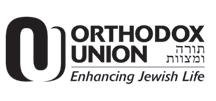
Nevertheless, Orchot Shabbat (22:57), regarding our exact case, permits the setup without stipulations (he agrees with your shul that the guard should be told to open the door manually to avoid “degrading Shabbat”). He does not explain why benefit is not a problem, and we will now discuss possible reasons.
1. In many areas of Halacha, there is a distinction between positive benefit and the removal of an impediment from benefit. Some of our time’s major poskim (see Melachim Omnayich p. 525) disagree whether unlocking a door is removing an impediment (i.e., no prohibition of benefit) or providing entry (i.e., can be prohibited).
2. Not only is the Shulchan Aruch (OC 252:4) the simpler opinion, but the Rama is lenient in cases of need, which implies his opinion is a stringency. Furthermore, the Biur Halacha (ad loc.) says that the

Rama only applies to cases where Torahlevel melacha was done, which we assume does not occur by electrically unlocking the door. Therefore, the closest source we found for stringency likely does not apply here.
3. Finally, there is no benefit to speak of here, as the door will be open the same manually or electrically (see Shulchan Aruch, OC 276:4). Admittedly, in all likelihood, clicking gets you in a few seconds faster. But in the case poskim discuss (see Orchot Shabbat 23:53) of having a hotel worker bring an item to the room by elevator, when he could have walked, although the elevator is often quicker, the Jew can take the item immediately. In general, in Halacha, when getting something at a later time is significant depends on context (development of this idea is beyond our scope), and here, a few seconds seems insignificant.

Based on all we have seen, when the guard clicks you in, you may open the door and enter without delay.
Having a dispute?
For a Din Torah in English or Hebrew contact ‘Eretz Hemdah - Gazit’ Rabbinical Court: 077215-8-215 • fax: (02) 537-9626 beitdin@eretzhemdah.org

OU ISRAEL CENTER 63
We buy your Gold & Silver Personal home service - 30 years experience We also buy silverware, gold & silver coins! Please send me a picture to Whatsapp for free appraisals I pay cash! I will meet you where you want! Customer service! 972-54-219-2428 mail: absaffran@gmail.com Follow Us On Facebook
The Birth Mother
Last time we discussed the case of the woman who delivered a baby that was not genetically hers due to a mistake in the fertility lab. Unfortunately, the clinic was not able to locate and identify the genetic parents.
Last time we presented a source that in such a case the genetic mother is the halachic mother. There are other sources that indicate the exact opposite, for example, the Gemara (Yevamot 97b) discusses the case of a woman who converted to Judaism during her pregnancy. She then delivers twin boys who are halachically considered to be Jewish and to be brothers. Even though the boys were conceived when the mother was not Jewish and, therefore, they are “genetically” not Jewish, since the birth was after the conversion they are both Jewish and siblings. The Book of Esther (2:7) describes Esther as having no mother, which the Gemara (Megillah 13a) explains to mean her mother died during childbirth. Rashi elucidates that the rationale behind this explanation is that she died prior to being classified as Esther’s mother. Her mother was her genetic mother, but, since she died during childbirth, was not her birth mother. These sources, albeit not definitive,
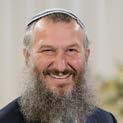
do suggest that birth is more formative in determining motherhood.
Some have suggested that modern science “proves” that the birth mother is the mother. There is an interchange of cells from the gestational mother and the fetus. Cells of the baby have been found in the carrier’s brain and the opposite has also been demonstrated. In the words of the late and great Rabbi Tendler and Dr. John Loike “the fact that maternal-fetal cell exchange takes place in normal pregnancies is consistent with the few studies that it occurs in surrogacy as well. This information, coupled with our emerging understanding of how environmental factors impact the health of the fetus, via epigenetics, indicates that the surrogate is more than merely an incubator for fetal development. Rather, she plays a critical role in fetal development and in the future behavioral and physiological health of the child.” In my opinion this is not a proof since the question is not a medical or scientific one, as to who has the greatest percentage of maternity, rather a halachic determination based on our own sources. In addition, the contribution to the genetic makeup of the child during pregnancy is almost insignificant compared with the genetic contribution of the genetic mother. However, the current case is more complicated than that.
More on this next time.
64 TORAH TIDBITS 1497 / MIKETZ 5783
RABBI
Machon Puah for Fertility and Gynecology in Accordance with Halacha
GIDEON WEITZMAN
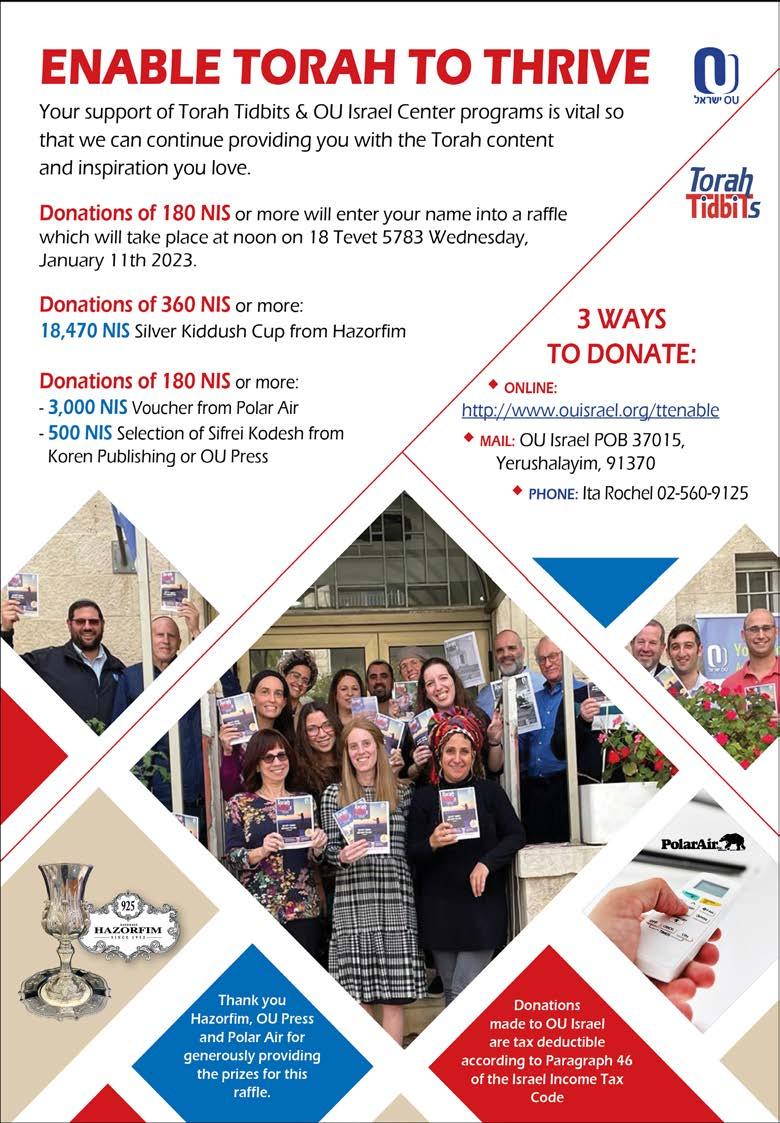
OU ISRAEL CENTER 65
THE DAILY PORTION
BY SIVAN RAHAV-MEIR
To Be A Miracle in the Life of Someone Else
Last night, I was starting to lose attention while listening to Rabbi Zalman Vishetsky during a Mitchadshot (women’s renewal) workshop the moment he said: “I want to tell you a story about a miracle!”. If you read me regularly you know that I am not inclined to tell miracle stories. But, nevertheless, here is the story that he told:
One night there was an earthquake in California. Everything moved, including the Chabad synagogue on the famed Pico Boulevard in Los Angeles, which shook from top to bottom. Chairs flew from where they stood, prayer books fell, everything was turned upside down.
At that moment, a single young man sat and learned alone in the synagogue. He saw what happened and decided to return everything to its proper place. He worked for many hours returning books to their shelves, cleaning and sweeping, putting everything back in order. When morning
came, no one noticed that the earthquake had visited the synagogue. The morning minyan came as usual to pray Shacharit. All the buildings in the city were turned upside down and only their synagogue was spared. What a miracle.
The young man heard everyone talking about the great miracle and he initially wanted to tell them what he did all night long. But then he stopped himself and understood: They did encounter a miracle here, and it was me.
I think that there is a profound message in this story. We can be the miracle in the life of someone else; we must be the miracle in the life of someone else. We don’t have to say much. It can all happen behind the scenes. But we must take responsibility and take action in the world. To look at our child, at our spouse, or at someone whom we met by chance, and to believe that we can be a miracle in their life.
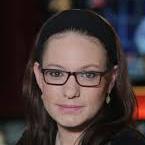
After Rabbi Zalman Vishetsky’s idea that one person can be a miracle in the life of another was published here, I was flooded with stories of miracles. Here are two of them that can serve as examples of miracles within humanity, which we ourselves create by helping our fellow man:
* “In our neighborhood there is a group of kids that hang around and make mischief every night. The day before a recent holiday, I needed additional help for my
66 TORAH TIDBITS 1497 / MIKETZ 5783
grocery store. I suggested to one of these kids that he carry some boxes for me and I would pay him for several hours of work. I immediately regretted the suggestion since, up close, he looked almost like a criminal. To my surprise, he took the job seriously and did outstanding work. I gave him more and more jobs to do and now he is the supervisor of the evening shift at the store and my right hand man. Lately he told me that he feels that a miracle happened to him. I went home with the feeling that I was his miracle.”
* Mazal Malka, supervisor of the municipal call center in Kiryat Shmona, wrote me as follows:

“A 13-year-old boy was on his way to boarding school with a suitcase containing many valuable items. He left the suitcase at a bus stop while he ran home to get something. He was gone for only a minute but when he returned his suitcase was gone. His mother contacted the call center, we checked surveillance cameras in the area, and published what had happened on social media. The suitcase was not found, but the residents of Kiryat Shmona got together and gifted a suitcase to the boy, as well as a personal computer, miscellaneous gear, and many valuable accessories. His smile in response to such generosity was worth everything to those who had helped. Today I read in the Daily Portion how we can be the miracle in someone else’s life. I then recalled how, after the boy’s suitcase and valuables were restored, his mother said to me:
‘You are our miracle.’”
May we all merit to notice opportunities to be a miracle in someone’s life.
OU ISRAEL CENTER 67
REBBETZIN SHIRA SMILES Faculty, OU Israel Center
BY RABBI MOSHE BLOOM en.toraland.org.il
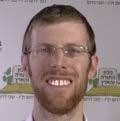
Tribute to the Trio
In a deeply powerful scene, Moshe Rabbeinu is found with his hands held high on top of the mountain praying for the people gripped in a raging battle with Amalek below. Ahron and Chur stood on either side of Moshe Rabbeinu holding his hands aloft (Shemot 17;10). Rashi teaches that Chur was the son of Moshe’s sister, Miriam. What more do we know about Chur? What is the symbolism of his joining with Ahron to support the hands of Moshe Rabbeinu?
of mounds of earth], lest the latter crumble. [The rationale is that] the prohibition of orlah is more severe, because benefit from it is forbidden.
Those who are meticulous in their observance of the Torah’s prohibitions would set aside money in the Sabbatical year and say: “The holiness of everything harvested from these fruits of the fourth year is transferred to this money.” [The redemption must be carried out in this fashion,] because it is forbidden to redeem [the produce] while it is attached to the ground, as explained.


That is: even though the fruit is hefker and is thus exempt from terumot and ma’aserot, its neta revay sanctity still must be transfered to a coin.
When a person had [an orchard that was in] its fourth year of growth in the Sabbatical year when everyone is allowed equal access to it, he must mark it with mounds of earth so that [those who take the produce] will recognize [its sacred quality] and not partake of it until they redeem it. If [the produce is] within the [three] orlah years, it should be marked with baked clay so that [people] will shun it. [We use clay instead
Rabbi Roberts in Through the Prism of Torah explains that Ahron and Chur personified contrasting character traits. Ahron was a peacemaker, he constantly looked for ways to create harmony among his people. Indeed, he was ready to compromise his own values to achieve this goal, as we see in the story of the sin of the golden calf. Chur,
on the other hand, was a person who stood strong in his values, unbending and resolute in his beliefs. Chazal teach that Chur tried to challenge the people when they wanted to build the calf and they subsequently killed him. Chur, a descendent of Yehudah, was a person who was inflexible and strong like a lion. Truly, a combination of both qualities is necessary. In interpersonal relationships it is wise to follow Ahron’s path, to compromise and make peace whenever possible. However, in the service of Hashem and reinforcing kevod shamayim, one needs to follow Chur’s example and be resolute in his values. These two special people joined Moshe Rabbeinu to activate the merits of these approaches as he implored Hashem to have mercy on His people and vanquish Amalek, physically and spiritually.
If your tree was planted from 15 Av 5778 to 15 Av 5779, The fruit is now considered neta revay. Because the fruit began to form during the shemitah, it is are also hefker and has kedushat shevi’it and in addition, kedushat neta revay.

More next week.
For Sale - Gorgeous apartment in Old Katamon
In a unique Old Arab style building - Spacious 110sqm, 4 room apartment with Sukah balcony, Shabbat elevator, parking & large separate storage room. lots of character, excellent condition, central A/C Truly one of a kind! 5,280,000nis
For Sale – Old Katamon, Negba st., 1st floor, Arab house, 4 rooms, (total about 160m), high standard of renovation, Sukkah porch, 2 full bathrooms + guest bathroom, central a/c, elevator, parking, small machsan, asking $2,550,000
68 TORAH TIDBITS 1497 / MIKETZ 5783
Revay and Shemitah #1 Rambam (Hilchot Ma’aser Sheni VaNeta Revay 9:7) rules according to The Mishna (Ma’aser Sheni 5:1): הָוָׁש לּכַה דַּיֶׁש הָּטִמְּׁשַה תַנְׁשִּב יִעָבְר עַטֶנ ֹול הָיָהֶׁש יִמ ּוּנֶּמִמ ּולְכאֹי אֹלְו .ֹוּב ּוריִּכַּיֶׁש יֵדְּכ הָמָדֲא תֹוזָזֹוקְּב ֹונְּיַצְל ְךיִרָצ םיִסָרֲחַּב ֹותֹוא ןיִנְּיַצְמ הָלְרָע יֵנְׁש ְךֹותְּב הָיָה םִאְו .ּודָּפִּיֶׁש דַע אָּמֶׁש הָמָדֲא תֹוזָזֹוקְּב ּונְּיִצ םִאֶׁש .ּוּנֶּמִמ ּוׁשְרְפִּיֶׁש יֵדְּכ .הָיָנֲהַּב הָרּוסֲא איִהֶׁש אּוה רּומָח הָלְרָע רּוּסִאֶׁש .ּורְרָּפְתִי לָּכ ןיִרְמֹואְו הָּטִמְׁש תַנְׁשִּב תֹועָּמַה תֶא ןיִחיִּנַמ ּויָה ןיִעּונְּצַהְו יִא יֵרֲהֶׁש ּוּלֵאָה תֹועָּמַה לַע לָּלֻחְמ ּוּלֵא יִעָבְר תֹורֵּפִמ טָקְלִּנַה :ּונְרַאֵּבֶׁש ֹומְּכ רָּבֻחְמִּב ֹותֹוּדְפִל רָׁשְפֶא
TORAH VEHA'ARETZ INSTITUTE
Neta
26 TORAH TIDBITS / BESHALACH 5781

OU ISRAEL CENTER 69 3 STRAUSS STREET, JERUSALEM | PHONE 02-380-3060 | OFFICE@JTC.ORG.IL Come in. Let’s talk. The Jerusalem Therapy Center Now Open Quality and affordable care given by compassionate and knowledgeable therapists Mental health therapy especially designed for English-speaking adults, including gap-year students, new olim and lone soldiers

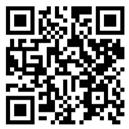
70 TORAH TIDBITS 1497 / MIKETZ 5783 FOR YOU IT IS A TACTICAL TRAUMA KIT FOR THEM IT IS A LIFE! $360 TO SAVE A LIFE UNITED HATZALAH HELP SAVE LIVES! SCAN TO GIVE TODAY! israelrescue.org/kit IN 2022, ISRAEL HAS SEEN 10% INCREASE IN TRAUMA CALLS AND 61% INCREASE IN TERROR ATTACKS
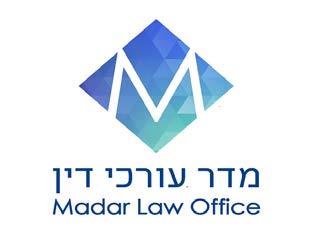




OU ISRAEL CENTER 71
. Family Law and Mediation Divorce, Child support, Custody Inheritance & Wills Yariv Madar, Adv. Bodily Injuries, Medical Malpractice Civil Litigation 10 Hillel St., Jerusalem | 36 Dam hamkabim st., Modiin 02-6255592, 050-3202909 Madar@netvision.net.il OU ISRAEL CENTER 59 www.ashleywilde.co.il • Curtains & draperies • Designer curtains • Venetian & Woven wood blinds • Blackout, Vertical, Roller, Roman & Pleated shades
ENGLISH SPEAKING LAW FIRM Orit Madar,Adv
TOWARDS MEANINGFUL
TEFILLA
BY REBBETZIN ZEMIRA OZAROWSKI Director of OU Israel L’Ayla Women’s Initiative

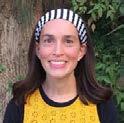
םחר
If you remember your days in Ulpan, or in grammar class in any language, you probably cringe at the memory of conjugating verbs in past, present, and future. And as you struggled in memorizing those verb charts, the thought probably crossed your mind – “Can’t they just leave things simple? Why do we need a different way to say each word depending on when it occurs? What’s the big difference between past, present, and future??”.
But the fact is that past, present, and future are three completely different spheres in time and denote three different aspects of ourselves. The past represents all that has made us into who we are today, the present is where we are at right now, and the future represents our goals and dreams and all that we strive to be.
in the paragraph of םחר, we enter into the future.
,ָךֶריִע םִיַלָׁשּורְי
72 TORAH TIDBITS 1497 / MIKETZ 5783
This idea is reflected in our bentching experience. As we learned in the past articles, we started off the Birchat Hamazon with the paragraph of ןזה by thanking Hashem for the obvious – for the food that we are receiving right now in the present. In the paragraph of ךל הדונ, we then moved a bit backwards, thanking Hashem for everything that happened in the past that led up to the food….for the land that we received after being taken out of slavery and entering into a covenant with Hashem. And now, לַעְו ,ָךֶּמַע לֵאָרְׂשִי לַע ּונקֹלֱא 'ה אָנ םֶחַר לַעְו ,ָךֶחיִׁשְמ דִוָּד תיֵּב תּוכְלַמ לַעְו ,ָךֶדֹובְּכ ןַּכְׁשִמ ןֹוּיִצ לַעְו ,ּוניִבָא ,ּוניקֹלֱא .ויָלָע ָךְמִׁש אָרְקִּנֶׁש ׁשֹודָקַהְו לֹודָגַה תִיַּבַה ּוניקֹלֱא 'ה ּונָל חַוְרַהְו ,ּונֵחיִוְרַהְו ּונֵלְּכְלַכְו ּונֵסְנְרַפ ,ּונֵנּוז ,ּונֵעְר יֵדיִל אֹל ,ּוניקֹלֱא 'ה ּונֵכיִרְצַּת לַא אָנְו .ּוניֵתֹורָצ לָּכִמ הָרֵהְמ הָאֵלְּמַה ָךְדָיְל םִא יִּכ ,םָתָאָוְלַה יֵדיִל אֹלְו םָדָו רָׂשָּב תַנְּתַמ םָלֹועְל םֵלָּכִנ אֹלְו ׁשֹובֵנ אֹלֶׁש ,הָבָחְרָהְו הָׁשֹודְּקַה הָחּותְּפַה .דֶעָו 'ה הָּתַא ְךּורָּב .ּוניֵמָיְב הָרֵהְמִּב ׁשֶדֹּקַה ריִע
םִיַלָׁשּורְי הֵנְבּו .ןֵמָא .םִיַלָׁשּורְי ויָמֲחַרְב הֵנֹוּב
Have mercy, Hashem our G-d, upon Israel Your people, upon Jerusalem Your city, upon Zion the abode of Your glory, upon the kingship of the house of David Your anointed, and upon the great and holy House over which Your Name was proclaimed. Our G -d, our Father, our Shepherd, nourish us, sustain us, feed us, and provide us with plenty; and speedily, Hashem our G-d, grant us relief from all our afflictions. Hashem our G‑d, please do not make us dependent upon the gifts of mortal men nor upon their loans, but only upon Your full, open, holy, and generous hand, that we may never be shamed or disgraced. And rebuild Jerusalem the holy city speedily in our days. Blessed are You, Hashem, Who in His mercy rebuilds Jerusalem. Amen. We tend to think of Birchat Hamazon as a “Grace after Meals”, a thank you to Hashem after our meal. But when you look at this paragraph, there is not one word of thanks here, only a litany of requests. This
is because while we are very thankful for all Hashem has done for us in the past to get us to where we are today, and very happy where we are at this moment, we can never end there. Because as individuals and as a nation, we always need to be dreaming forward. We can never sit on our laurels and be so completely satisfied with where we are, that we don’t make goals of how to grow in the future.
So we now turn to Hashem and say –thanks for the land and the food, and the Brit and the Torah, but now we want to move a step forward. And we need Your help in order to do that. Please have mercy on us and help us as a nation reach our des tiny. Enable the Davidic dynasty to reign once again, help us to restore Yershalayim, and to rebuild the Beit Hamikdash. Without those key components, we cannot move forward to where we need to get to.

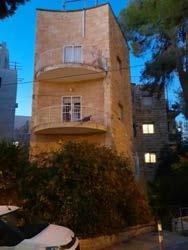

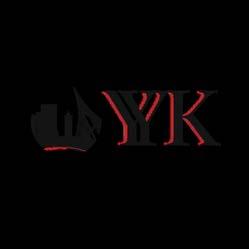
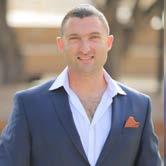

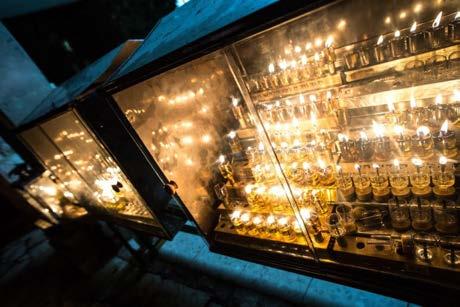
And so while on first glance, a request to rebuild the Beit Hamikdash seems completely not connected to a Tefilla in which we seemingly should be thanking Hashem for our food, it actually goes hand in hand. Because as we mentioned in previous articles, we don’t believe in food and materialism as means to an end. We are glad and thankful to have them, but only in order to help us move forward on a spiritual plane and to reach the goals that we need to attain both as individuals and as a nation. Ultimately, the best way to show Hashem our appreciation for what He has given us, is by showing Him through our requests in םחר, that we want to take that investment that He has put into us and use it to push on to the next level. May those requests be answered speedily in our days, ונימיב

OU ISRAEL CENTER 73
הרהמב
Most Recent Listings in Jerusalem Yitzchak Kowalsky 054-766-0338 Yitzchak@yykrealestate.com www.yykrealestate.com Great Opportunity in Rechavia 2 bedroom Garden Apartment 65 sqm Rare & quiet Full of potential! Immediate occupation! Private land! 3 bedroom 2 full baths Upgraded apt including: Floor heating Central A/C Balcony (not Succa) Fully furnished with appliances! Shabbat elevator Parking & storage Available: immediately! !חמש םירוא גח New Project on Mekor Haim Street Penthouse: 147 sqm +114 sqm terrace Large 5 Bdrms + 13 sqm balcony High end specs Great prices and payment plans
.
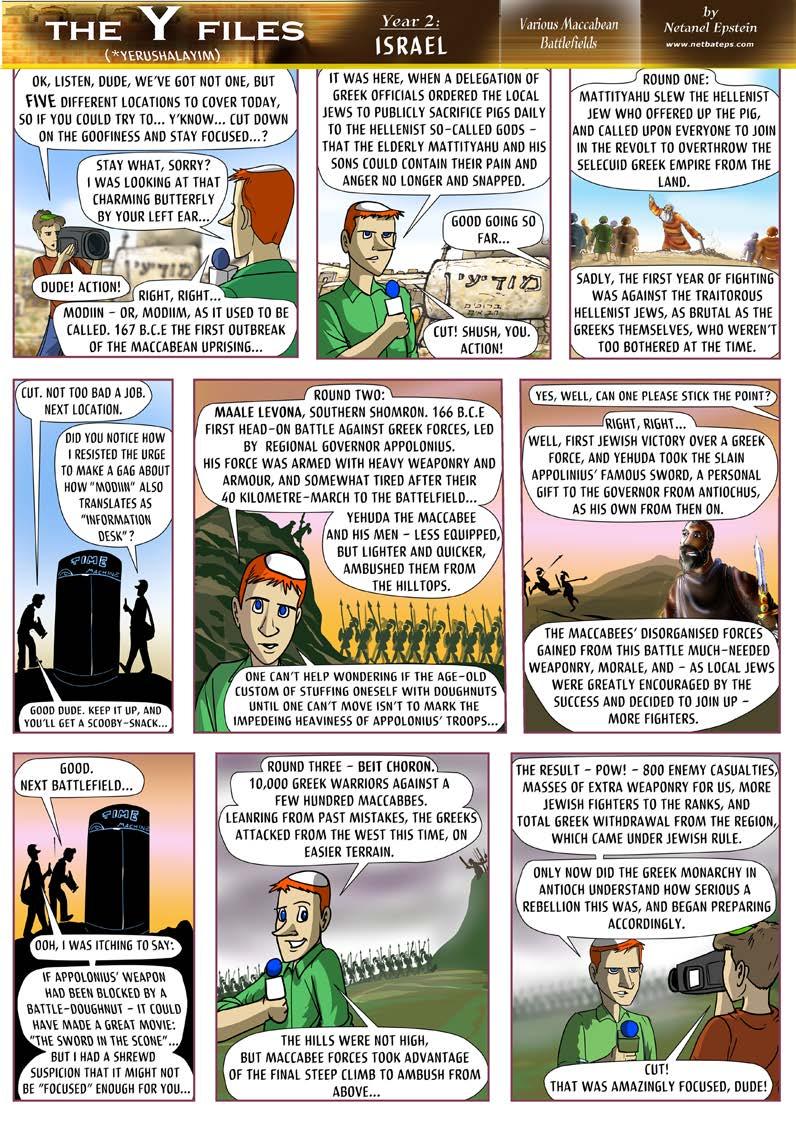
74 TORAH TIDBITS 1497 / MIKETZ 5783

OU ISRAEL CENTER 75
TORAH 4 TEENS
BY TEENS NCSY ISRAEL



Devorah Cohen Raanana Chapter Madricha Dreams, Candles and Geulah
Parshat Miketz begins with Yosef being called upon to interpret Pharaoh’s dream. Yosef knows and acknowledges that Hashem is the driver on his journey, saying ־תֶא הֶנֲעַי
Very impressed, Pharaoh appoints Yosef as his “right hand man”! In Yosef’s new position he finds himself face to face with his brothers, yes, the very same brothers that bowed down to him in his dreams, and the very same brothers that wanted to kill him, but eventually sold him.
It is no coincidence that Parshat Miketz is read publicly on, or close to, Chanukah.
The Talmud teaches us that the enmity between Yosef’s brothers leads to our enslavement in Egypt: “לֵּגְלַּגְתִנְו ויָחֶא ֹוּב ּואְּנַקְתִנ םִיַרְצִמְל ּוניֵתֹובֲא ּודְרָיְו רָבָּדַה”
In a similar way, the fighting and hatred amongst the Jewish leaders at the time lead to Antiochus’s decrees and desecration of the Beit Hamikdash.
The lessons of Miketz and Chanukah are the same, unity leads to redemption.
Another similarity between Miketz and Chanukah is the relationship between Hashem and the Jewish people.
On Chanukah we celebrate the miracles of defeating the Greeks, and the oil lasting 8 days. Yosef’s story is full of miracles as well; he didn’t die in the pit, the Saar HaMashkim remembered him, Pharaoh rewards Yosef’s interpretation of his dream, and Yosef and his family reunite and forgive.
From here we learn that coming together as a nation brings us closer to Hashem and his miracles and blessings.
We too are witnesses to miracles! After 2000 years in Galut we are a Nation in the Land of Israel! It can be summed up in a quote from the Abarbanel: םדחאתהב הלתנ םתוראשהו לארשי בוט לכש יפל“ “דחי
“All the good of Israel, and its survival, depends on its unity.”
Parshat Miketz and Chanukah teach us to appreciate all the miracles, both large and small, that Hashem does for us on a daily basis. We also learn that when Am Yisrael comes together, Hashem and Am Yisrael come together. B’ezrat Hashem we can all learn from this Parsha and Chanukah to come together, and hopefully then, Hashem will come together with us, and bring Mashiach. Chag Sameach!
donated by Marion & Michael Silman Ita Rochel 02-560-9125
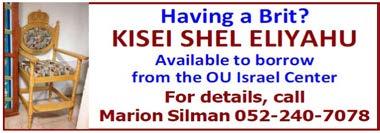
76 TORAH TIDBITS 1497 / MIKETZ 5783
ףֵסֹוי ןַע ַּיַו“ ”הֹֽעְרַּפ םֹולְׁש
םי ִהֹלֱא י ָדָעְלִּב ר ֹמאֵל הֹעְרַּפ־תֶא
Rabbi Grodzinski taught that the “redeemed” individual does not ignore the prevalence of evil in the world but disdains it and confronts it wisely and successfully.
Kinneret Rosensweig 9th Grade, Raanana
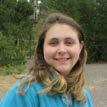
“Our Inner Light”
And Rabbi Ziv, the Alter, gifted us with the insight that our relationship with the Almighty can be reciprocal. Yes, He is our Savior. But we can reciprocate His salvation by bringing honor to His name by acting ethically and honestly, even in the face of temptation.
It is well known that the halacha of placing our menorah in a place where passerby can see it. The reason is to publicize the miracle of Chanukah. The Magid of Kozhnitz says that there is another reason. When some of the Jewish people transitioned to the Greek religion, all that appealed to them in the Greeks was the flashy, seemingly perfect impression that could be seen on the outside. They didn’t care about the incorrect morals of the Greeks and the ugliness that was on the inside. This led to the desecration of the Beit HaMikdash.
As we draw ever closer to the Passover holiday, Chag HaPesach, we now have learned of no less than six paths to redemption, six paths to “seeing ourselves as if we personally were redeemed from Egypt.”
Which of the six will you choose as your path? Or will you try your hand at all six?

This is the reason we put our menorahs in a visible place; we want the world to see deeper than just the outer impression, and really take a look inside before making decisions. We want to pass on the holiness of the mitzvah to those outside, and show them how beautiful the inside can be.
This is a recurring theme in the story of Chanukah, and I think it is an important one, something we should all try to implement in our personal lives. If we would all take the time to understand things before judging them, perhaps we would finally reach the peaceful reality we are striving for.
NCSY Israel is the premier organization in Israel, dedicated to connect, inspire, empower teen olim to the Land of Israel by encouraging passionate Judaism through Torah and Tradition. Find out more at israel.ncsy.org

OU ISRAEL CENTER 77
15 “redeemed” individual to our attention.
02-651-4030 www.eifermanrealty.com It’s never too late to file prior years’ tax returns! 02-999-2104 | 09-746-0623 | 03-527-3254 052-274-9999 Email: alan@ardcpa.com www.ardcpa.com Trusted US/Israeli tax services for over 30 years • U.S. Income Tax Returns • Israeli Tax Returns • Foreign Bank Reports (FBAR) • IRS Audit Representation • IRS Streamlined Program • Corporate Tax Planning • Estate and Trust Tax Planning • $1400 U.S. Child Credit • Investment Planning • Bookkeeping Services • Other Accounting Services ד“סב לייא תולבוה ד״סב www.premiummoving.co.il MovingPackingStorage 053-7272-815
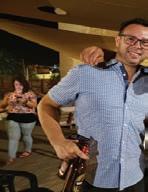
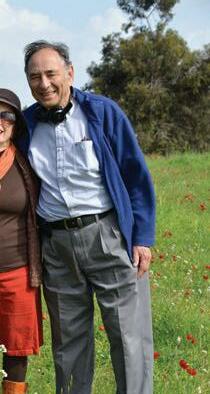
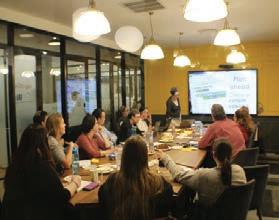
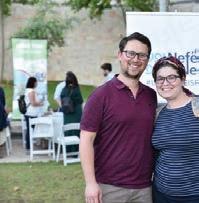
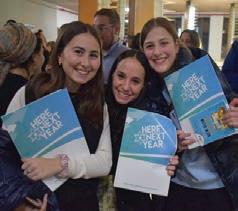
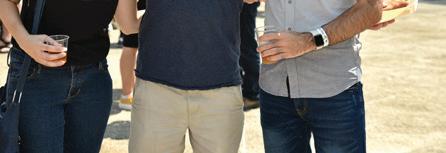


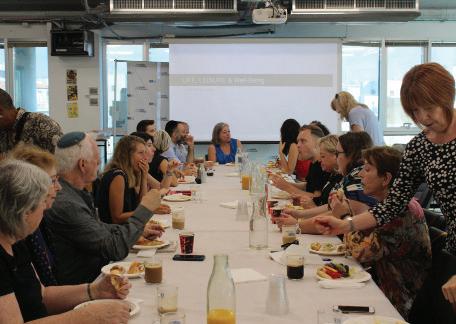
78 TORAH TIDBITS 1497 / MIKETZ 5783 www.theisraelcalendar.org Visit The Nefesh B'Nefesh Israel Calendar to explore English-language events taking place all over the country!
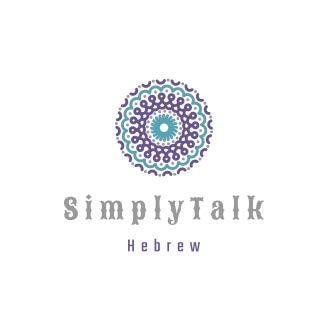


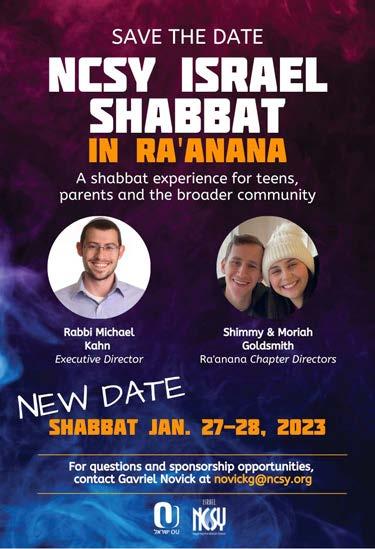
OU ISRAEL CENTER 79 Learn Hebrew like never before! Live zoom immersion courses for women Vibrant interactive classes * Exceptional teachers * Small groups * Years of experience * Proven results * Meticulouslyplanned lessons * Women only * Six levels * Approved by Mechanchim. Contact us now to book a free assessment and consultation. Sign up until Jan 4th for a 10% discount. Call or Whatsapp: 972-58-651-9474 Email:Office@simplytalkhebrew.com Visit our website:www.simplytalkhebrew.com
BY WYNDHAM JERUSALEM
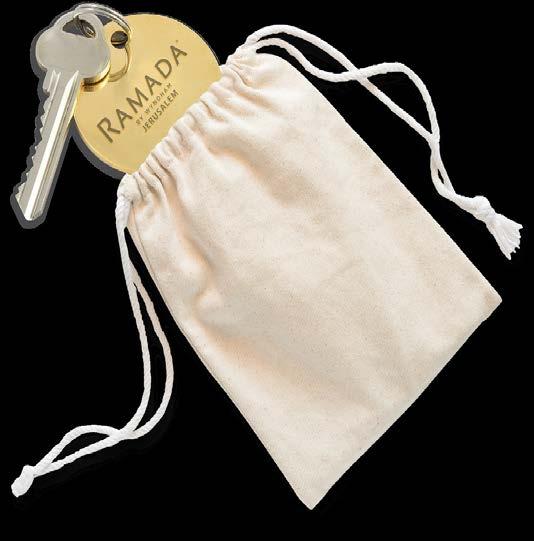

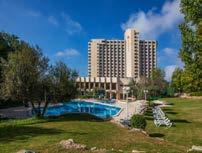
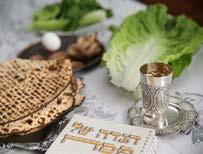

ןמוקיפא This year treat yourself AND your family Pesach at the Ramada Jerusalem …because you deserve it! Spacious & airy rooms | family oriented | heated indoor pool and tness center | highest standard of kashruth: Jerusalem Rabbinate Mehadrin, OU Glatt, Shmitta L'Chumra, ,Non-gebrochts, no Kitnoyot | Sumptuous festive meals | cultural programming, lectures and quality entertainment for the entire family Take it easy - Shabbat Hagadol at Ramada Hotel For reservations: 02-6599950 | www.ramadajerusalemhotel.com | reservations@ramadajerusalem.com
























































































































































































 RAV DANIEL MANN
RAV DANIEL MANN
























































